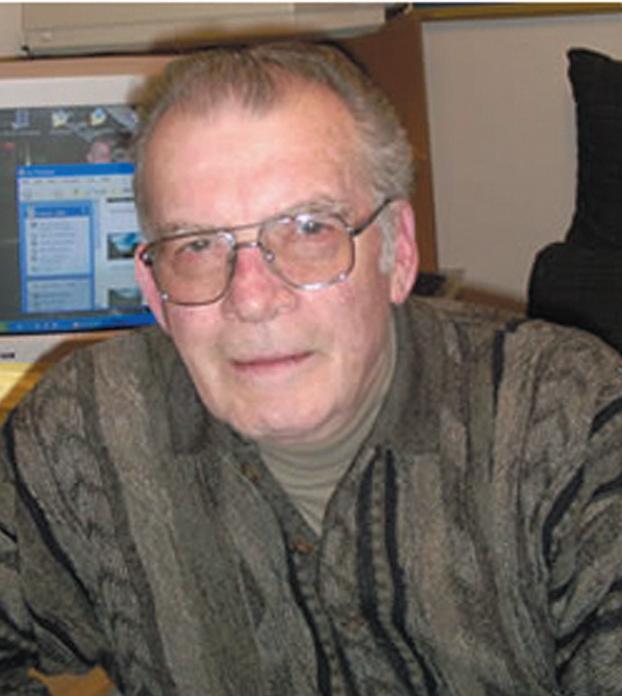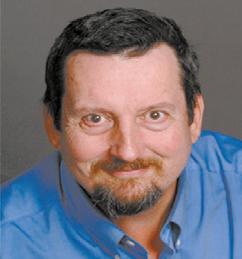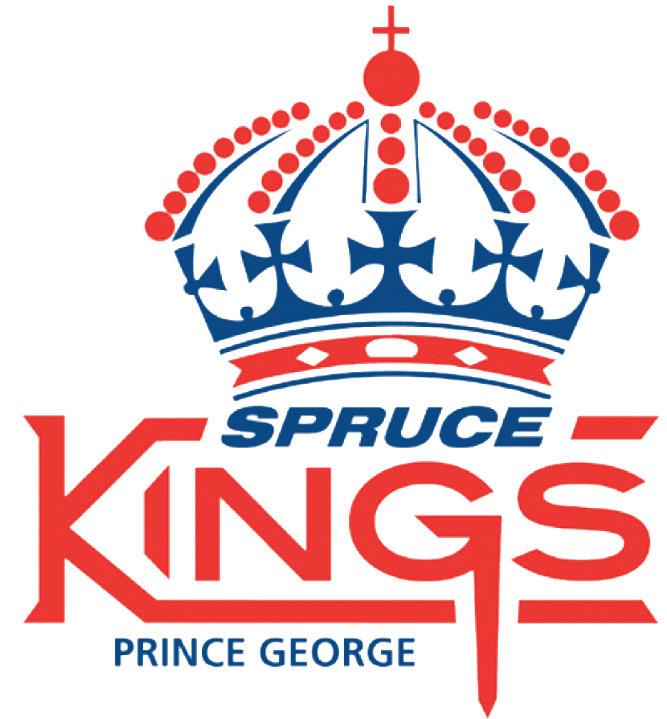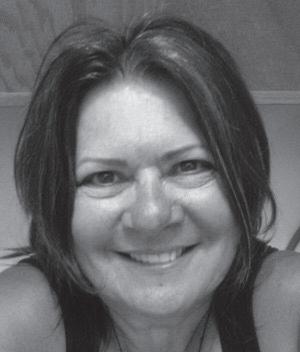
Volunteer Jasmyn Lai places in a turkey in one of the many bags that will be delivered as part of the Prince George Council of Seniors annual Christmas Hamper event. Nearly 200 hampers will be delivered to seniors in need.




Volunteer Jasmyn Lai places in a turkey in one of the many bags that will be delivered as part of the Prince George Council of Seniors annual Christmas Hamper event. Nearly 200 hampers will be delivered to seniors in need.


Mark NIELSEN Citizen staff mnielsen@pgcitizen.ca
A home in the Central Fort George neighbourhood remained behind police tape and investigators were on the scene Monday searching for clues that could help solve the first homicide of the year in Prince George.
In what police described as a targeted attack, a 30-year-old man died in hospital Friday from what appeared to be a gunshot wound. RCMP had been called to the scene in the 700 block of Johnson Street at about 5 p.m. and found the man outside the home.
The home had the markings of a drug house, a neighbour said, with some rough characters passing through over the years.
However, RCMP said Monday that police cannot yet confirm whether the homicide was related to the drug trade.
“Investigators will look at all possible motives,” Prince George RCMP spokesperson Cpl. Craig Douglass said.

A house for sale with a “sold” sign on top was posted on the front lawn and another neighbour said it appeared the home’s occupants were in the process of moving out.
Another neighbour said she did not hear any shots but did see police converge on the scene.
“It was kind of scary because they (RCMP) had come out with their guns,” she said.
About the only contact she had with those living in the house occurred when an “older gentleman” knocked on the door of her home and asked for a cigarette.
“My friend does smoke so he gave him a cigarette and he left,” she said. “And then he came back the next day and wanted another cigarette and we just thought ‘well, this is just getting to be like...’ so we said ‘no, that’s it.’”
She never had any trouble with those living in the home but had heard rumblings about “lots of activity going on there.”
“I know that they’re everywhere, these drug houses or whatever,” she said.
“I just didn’t think there was any in our neighbourhood to tell you the truth because you don’t really watch for that, or at least I don’t.”
It was the first homicide of the year, RCMP confirmed. Police have not provided the victim’s name.
In contrast, four investigations into homicides were opened in 2017 beginning in late January with a double murder after two men were found shot dead in a vehicle on the side of Foothills Boulevard near North Nechako Road.
A third person found in the vehicle survived and four men – Seaver Tye Miller, Aaron Ryan Moore, Joshua Steven West and Perry Andrew Charlie – are to go to trial on counts of first-degree murder in 2019. And Christopher Clarke Prince remains in custody on a count of seconddegree murder of Shane Whitford in May.
Police are also treating as homicides the disappearances of Roberta Marie Sims in May and Lloyd Sword in August.
Citizen staff
Operation Red Nose delivered 244 safe rides home, covering 5,847 kilometres on its third weekend of service in Prince George.
On Friday, 80 volunteers making up 19 road teams delivered 119 rides, travelling 2,898 kilometres.
It was the second-busiest fifth night in the effort’s 21-year history. In 2012, 124 rides were provided on the same night.
“The phones started ringing shortly after 9 p.m. and didn’t really slow down until after 2 a.m.,” said Andrea Johnson, Operation Red Nose spokesperson.
“All 19 teams were on the road by 9:45 p.m.”
On Saturday, 67 volunteers fielded 16 road teams and delivered 125 rides, travelling 2,949 km. So far, after six nights, volunteers have provided 586 rides and travelled 15,048 km.
As for volunteers, only 16 teams are signed up for New Year’s Eve.
“That number needs to be at least doubled to meet the demand for rides we expect,” said Johnson.
“It means at least another 48 volunteers are needed, whether they’ve only volunteered with us one night or are former clients.”
The deadline to drop off applications to the Prince George RCMP is Wednesday. The application, which includes a criminal record check, is available online at www.ornpg.ca
Red Nose volunteers are back in service on Friday and Saturday. Those who require a ride home can call 250-962-7433 between 9 p.m. and 3 a.m. Operation Red Nose is organized by the Rotary Club of Prince George-Nechako in partnership with ICBC and the Prince George RCMP.
Prince George RCMP’s municipal traffic services section took 11 drivers off the road on Friday and Saturday for allegedly getting behind the wheel while impaired.
Nine were issued 90-day immediate roadside prohibitions with a 30-day vehicle impoundment, issued for driving with a blood-alcohol level over 0.1 and three were issued a seven-day impoundment for a blood-alcohol level between 0.06 and .099.
They were a result of a series of static check stops and roving patrols around the city. As well, seven tickets for speeding were issued, as were eight for intersection related violations, two for distracted driving (cellphones) and four for driving while prohibited.
Three vehicles were sent for inspection due to improper or inadequate equipment.


Cirque Musica Holiday presents Wonderland performed an acrobatics-filled show at CN Centre on Saturday night. For more photos from the event, see Citizen Extra this Thursday.
From Prince George provincial court, Dec. 10-14, 2018:
• Justin Daniel Bell (born 1988) was sentenced to 555 days in jail and two years probation, issued a 10-year firearms prohibition and assessed a $200 victim surcharge for aggravated assault. Bell was in custody for 180 days prior to sentencing.
• Donavan Hans Smith (born 1989) was sentenced to 25 days in jail for willfully resisting or obstructing a peace officer, to 20 days in jail for possession of stolen property and assessed $200 in victim surcharges on the counts. Smith was in custody for 163 days prior to sentencing.
• Robert Aaron Nicholas (born 1979) was sentenced to 39 days in jail and one year probation, issued a three-year firearms prohibition and assessed a $200 victim surcharge for assault. Nicholas was in custody for 13 days prior to sentencing.
• Jordan Neil Shaw (born 1994) was assessed a $100 victim surcharge for breaching probation. Shaw was in custody for five days prior to sentencing.
• Jordy Martin Visser-Hayne (born 1996) was sentenced to 21 days in jail and assessed $200 in victim surcharges for two counts of breaching probation.
Visser-Hayne was in custody for four days
prior to sentencing.
• Michael Darren Felix (born 1994) was sentenced to 69 days in jail and one year probation and assessed a $100 victim surcharge for assault. Felix was in custody for 13 days prior to sentencing.
• Phoebe Casimel (born 1975) was sentenced to time served and one year probation for three counts of theft $5,000 or under and one count of breaching probation. Casimel was in custody for nine days prior to sentencing.
• David Nicholas Joseph Johnson (born 1987) was sentenced to 18 months probation and assessed $600 in victim surcharges for assault causing bodily harm, breaching an undertaking or recognizance and two counts of mischief $5,000 or under.
Johnson was in custody for 161 days prior to sentencing.
• Justin David Paul Clements (born 1985) was sentenced to five and three days in jail respectively and assessed $200 in victim surcharges for two counts of breaching probation.
• Shane Daniel Coulas (born 1997) was sentenced to 18 months in jail and assessed $400 in victim surcharges for breaking and entering and committing an indictable offence, willfully resisting or obstructing a
peace officer and two counts of breaching an undertaking or recognizance. Coulas was also sentenced to one day in jail on the break and enter count. Coulas was in custody for 86 days prior to sentencing.
• Stephen Leo Nezaticky (born 1986) was sentenced to 12 days in jail and one year probation and assessed $200 in victim surcharges for two counts of theft $5,000 or under and assessed a $100 victim surcharge for breaching probation. Nezaticky was in custody for 10 days prior to sentencing.
• Cody Jack Joseph (born 1996) was sentenced to 18 months in jail for being in a dwelling house without lawful excuse and breaking and entering and committing an indictable offence, to 150 days in jail for sexual assault and 30 days in jail for breaching probation.
Jack was also sentenced to three years probation and assessed $800 in victim surcharges on the counts and was in custody for 141 days prior to sentencing.
• Justin Lee Pierre (born 1987) was sentenced to 63 days in jail and one year probation, assessed a five-year firearms prohibition and assessed a $100 victim surcharge for assault causing bodily harm, committed in Tsey Keh Dene. Pierre was in custody for 17 days prior to sentencing.
• Kurt Werner Steinhauser (born 1982) was sentenced to 18 days in jail and assessed $200 in victim surcharges for two counts of breaching probation.
• Alexia Nicole Antoine (born 1995) was sentenced to one year probation with a suspended sentence for theft $5,000 or under, committed in Fort St. James.
• Danial Luke Armstrong (born 1990) was sentenced to 63 days in jail for assault and to three days in jail for assault causing bodily harm. Armstrong was also sentenced to three years probation on the counts as well as on a count of being in a dwelling house without lawful excuse. Armstrong spent a total of 68 days in custody prior to sentencing.
• Justin Curtis Latimer (born 1990) was sentenced to time served and assessed $300 in victim surcharges for three counts of possessing a controlled substance. Latimer was in custody for 65 days prior to sentencing.
• Duane Tyler Vallee (born 1988) was sentenced to 46 days in jail and ordered to pay $5,004 restitution for mischief $5,000 or under and to 30 days in jail for breaching a recognizance and to 18 months probation, committed in McLeod Lake. Vallee was in custody for 48 days prior to sentencing.



Christine HINZMANN Citizen staff chinzmann@pgcitizen.ca
You don’t even have to ask him. Mel McConaghy will tell you. He doesn’t care what anyone thinks about the words he uses or how he writes his stories.
At 82, he’s well past the age of political correctness, he said.
McConaghy has written several books and when he took a look at how an editor changed the first chapter of his second book, My Life Through a Broken Windshield, which was about his years as a truck driver, he decided to self-publish instead.
“I got sick and tired of people reading between the lines and trying to change my stories,” he said.
His latest books will be launched Friday at Books & Co. from 3 to 7 p.m. and they are unapologetically unedited. Each book is a work of historical fiction. River Spirit Woman is about a woman who makes her way to Fort George in the early 1900s through a set
Citizen staff

of adventurous circumstances while Gallant Ships is about Canadian ships and how they were instrumental in winning the Battle of the Atlantic during the Second World War.
McConaghy started writing when he was 68.
“I am a Grade 8 dropout,” said Mc-
RCMP are asking the public’s help in locating a Prince George woman who has not been seen in more than two weeks.
Kari Lea-Anne Baxter, 23, is described as First Nations, five-foot-six with brown eyes, long brown hair and a tattoo of a dreamcatcher on her neck.
Baxter was last seen on Dec. 1 and she was reported missing on Saturday.
Although she had been known to travel to Fort St. John and Grande Prairie, it is unusual for her to leave without advising family, RCMP said.
Anyone who may have information about where Baxter might be is asked to contact the Prince George RCMP at 250561-3300 or anonymously contact Crime Stoppers at 1-800-222-8477 or online at www.pgcrimestoppers.bc.ca (English only). You do not have to reveal your identity to Crime Stoppers.
Conaghy, who for years has written for magazines and offers his opinion pieces for radio.
“I’m not a writer,” McConaghy explained. “I’m a story teller. I’ve had quite a life and I love writing about it. I write because I enjoy writing and people enjoy reading my writing. I don’t write for English language puritans. I write for the workin’ man. I write in my own voice.”
He said after a while his children and grandchildren stopped listening to his stories so he figured he’d better put them on paper.
McConaghy often goes down to the seniors’ centre on Tenth Avenue.
“I profess to everybody over the age of well, whatever – that they should write their stories,” McConaghy said. “I tell them they should write. If I can write everybody can write. Just sit down and write the story the way you would tell a grandchild or a great-grandchild sitting by your knee because one day they won’t be there and all there’ll be is a one dimensional picture. If there’s a story there that they wrote it adds another dimension to that person and that’s important.”

Citizen staff
The Northern Health Connections buses will be making their last runs for the year this week but will return to regular operations during the first week of 2019.
Valemount to Prince George, Quesnel to Prince George, Burns Lake to Prince George and Fort Nelson to Dawson Creek are all set for Tuesday while Mackenzie to Prince George and Burns Lake via Fort St. James are set for Wednesday.
Prince George to Vancouver and Prince George to Fort St. John are both set for Thursday with the respective return trips on Saturday. McBride and Valemount to Kamloops, Burns Lake to Terrace, Fort Nelson to Dawson Creek and Quesnel to Prince George are all set for Thursday.
Prince Rupert to Prince George is set
The NH Connections booking centre will be closed on Christmas Day, Boxing Day and New Years Day but open on regular business days.
for Saturday with the return trip on Sunday.
In the new year, Prince George to Vancouver will run on Jan. 1, Prince George to Prince Rupert, Mackenzie to Prince George and Burns Lake via Fort St. James will run on Jan. 2, Vancouver to Prince George, Prince Rupert to Prince George, Prince Rupert to Prince George,
Prince George to Fort St. John, Burns Lake to Terrace and McBride, Valemount to Kamloops will run on Jan. 3, Fort St. John to Prince George will run on Jan. 5, Valemount to Prince George, Fort Nelson to Dawson Creek, Quesnel to Prince George and Burns Lake to Prince George will run on Jan. 8. Dawson Creek to Fort Nelson will run on Jan. 10.
The NH Connections booking centre will be closed on Christmas Day, Boxing Day and New Years Day but open on regular business days.
Full details on the NH Connections holiday schedule and other program information are available through the booking centre at 1-888-647-4997; via email at NHConnections@northernhealth.ca; or on the internet www.nhconnections.ca.
Dirk MEISSNER Citizen news service
VANCOUVER — The British Columbia government has ditched plans for a 10-lane bridge to ease traffic congestion south of Vancouver in favour of a smaller crossing and improvements to the existing George Massey Tunnel, Transportation Minister Claire Trevena said Monday.
Tens of thousands of motorists who make the daily snail’s pace commute through the tunnel route that links Delta and Richmond and funnels traffic to and from Vancouver will need to be more patient, she said.
Consultations on proposals for a six- or eightlane bridge or an expanded eight-lane tunnel underneath the Fraser River will start in 2019, Trevena told a news conference, adding she could not speculate when the project could be completed or at what cost.

“We’re going to be working more aggressively on the approaches to the tunnel and working within the tunnel,” Trevena said. “After that we’re having the consultations. We’re going to be then getting the business plan together by the fall of 2020, which will be saying this is how we’re going to be going forward and from that point we’ll be moving expeditiously.”
The former Liberal government had already begun work on a $3.5-billion, 10-lane bridge to replace the existing four-lane, 59-year-old tunnel, but the New Democrats put the plan on hold after the 2017 election.
“A 10-lane bridge is really the wrong project,” Travena said. “It’s been very clear from communities up to this point that they did not want a 10-lane bridge.”
Richmond city council had complained about the massive bridge project taking over agricultural and park lands, but the review says any replacement will still encroach on those areas.
An independent technical review of the George Massey crossing, commissioned by the NDP and released Monday, recommended a re-examination of the project’s needs.
The review by Stan Cowdell of consulting engineers Westmar Advisors said the 10-lane proposal exceeded the area’s requirements.
It recommended examining the addition of new tunnel capacity, including reusing the existing tunnel.
It also said the government should review the entire project to ensure it reduces future traffic congestion and provides enhanced public transit infrastructure.
Opposition Liberal Leader Andrew Wilkinson said the NDP does not have a plan to fix the largest bottleneck in British Columbia.
“Today’s announcement shows the NDP is planning Band-Aid solutions, like minor upgrades to the tunnel or a small bridge,” he said in a statement. “Neither of these options will get commuters home to their families sooner or more safely. We need a solution that plans for the next century.”
Work will start immediately on ways to improve traffic congestion near the Steveston interchange, followed shortly by safety improvements to the tunnel approaches and inside the tunnel, including better lighting and drainage, Travena said.
“People are frustrated at the unacceptable congestion and bottlenecks at the George Massey Tunnel,” Trevena said. “We understand that.”


HANDOUT PHOTO
Niilo Edwards, executive director of the First Nations Major Projects Coalition, Cheslatta band councillor Ted Jack, Jason Edworthy of BluEarth Renewables, Cheslatta band chief Corrina Leween, and Gareth McDonald of BluEarth Renewables, stand on top of the Kenney Dam in northwestern British Columbia.
Four bands are working with the coalition to jump-start the roughly $300-million hydroelectric project.
Ian BICKIS Citizen news service
Tired of waiting for major construction projects to come to them, a growing coalition of First Nations is instead taking the lead on ventures to better control their economic futures.
“We really are in a place looking to diversify our economies,” said Jasmine Thomas, a councillor of the Saik’uz First Nation in the Central Interior. “Really moving away from projects proposed and imposed on us, and changing that whole direction to projects that we’re leading, and that make sense to us.”
The Saik’uz are one of four bands working with an initiative called the First Nations Major Projects Coalition to jump-start a hydroelectric enterprise that has been stalled for decades.
The roughly $300-million Kenney Dam Water Release Facility is the first project the coalition has taken on in its mission to create a First Nation-led service providing trusted advice and co-ordination on getting major projects off the ground. “We are a first-of-itskind model,” said Niilo Edwards, executive director of the coalition. “What we do is we respond to the
requests that come in and provide the support necessary so that communities can make informed business decisions.”
The coalition, funded from provincial and federal grants, is designed to move beyond impact benefit deals towards greater initiative and ownership of projects with budgets of over $100 million, said Edwards.
“In this day and age, First Nations have the opportunity to become project proponents themselves. Gone are the days of treating First Nations as stakeholders. They are governments, they have interests in their territory, they have economic and social interests that need to be satisfied.”
To help First Nations get projects going, the coalition provides a forum for discussions and consultations as well as expertise, but it is not a project manager, nor does it negotiate on behalf of First Nations.
The Kenney Dam project is the most advanced for the coalition, but Edwards said he has received requests to look into electricity transmission projects as well as the potential for a provincial loan guarantee fund.
The group, which began taking
shape in B.C. in 2015 and now counts 47 members as far east as Ontario, is also framed around projects that meet standards of cultural values and environmental stewardship and to demonstrate how projects can advance with free, prior and informed consent.
The Kenney Dam project looks to have met the criteria of the Saik’uz, Nadleh Whut’en, Stellat’en, and Cheslatta Carrier First Nations involved in moving it forward. The project will direct overflow water from the dam southwest of Vanderhoof to a generation facility and restore water flow to a stretch of the Nechako River that was choked off when the dam was built in the 1950s to power the Rio Tinto Kitimat aluminum smelter.
The project has been proposed in various forms for decades. The coalition, along with independent power producer BluEarth Renewables Inc., is now advancing it through a new feasibility study with the hope of finally making it a reality, said Edwards.
“This project was on the books for 20 or 30 years, and the First Nations who have an interest in it today, struggled to advance the project until the coalition came
along and was able to act as a forum for capacity and technical support to make the project go, or at least as far as we’ve gotten it today...”
The coalition’s design of First Nation-led projects will help create more certainty for future projects, said JP Gladu, CEO of the Canadian Council for Aboriginal Business.
“It creates certainty for investors, it creates certainty for communities, and at the end of the day, this is an opportunity for First Nations to generate new revenue sources through infrastructure. So I think more of this has to happen.”
For Thomas, who acts as a spokeswoman for the four First Nations involved in the Kenney project, the development and the coalition in general are part of a new era for First Nation independence.
“We’re talking about a new political landscape,” she said.
“Having First Nations lead these type of projects, major projects, risks are definitely reduced.
“There’s a lot of economic certainty and it’s really helping to promote economic reconciliation for communities.”
Nicole THOMPSON Citizen news service
New rules that increase penalties for drunk driving and expand police powers to demand breath samples take effect across Canada today, with some predicting the law will face a series of legal challenges.
The legislation, which passed in June at the same time as new rules for drugimpaired driving, is intended to curb injuries and death by helping police catch drivers with more than the legal limit of alcohol in their bloodstreams. It gives police officers the right to ask for a breath sample from any driver they lawfully stop, lowering the bar from the previous legislation, which required that an officer have reasonable suspicion that a person had been drinking. Such a system is already in place in more than 40 countries. Toronto-based lawyer Michael Engel, who often defends those charged with impaired driving, said the new rules are a big change that raise concerns about baseless searches.
“This is a radical departure from previous law, which insulated people against warrantless searches without probable cause,” he said. The new rules could lead to a backlog in the legal system as lower courts wait for higher courts to make a decision on likely challenges to the law’s constitutionality, he said.
Civil rights organizations have also sounded alarms about the new rules, with the Canadian Civil Liberties Association expressing concern that mandatory alcohol screening will unfairly affect racial minorities who are disproportionately singled out by cops for traffic stops.
Frank PEEBLES Citizen staff fpeebles@pgcitizen.ca
Christmas is when connections between family, neighbours, community and even strangers have extra meaning.
At the Native Friendship Centre, the Christmas season inspires connections across the city, the region and radiates far beyond the NFC as their seasonal programs reach out to children, elders, the less fortunate, the disconnected, the hungry, the lonely and, most of all, the friends.
It started on Saturday when the NFC’s cultural advisor Bertha Cardinal led the annual Elders’ Christmas Dinner for a crowd of more than 120 seniors.
“It is a reminder of just how precious our elders are,” said NFC executive director Barb WardBurkitt. “We get lots of volunteers out to help at that event because everyone loves to be around our elders.”
It’s just the start of the holiday blitzin’ at the downtown-based organization. They still live by their foundational mandate from inception 49 years ago, to be a connec-
tive force for urban Aboriginal people living in Lheidli T’enneh territory be they local or from First Nations outside of the area.
Some of those people are living through hard times, many are far and even estranged from family, and luncheon at their Power of Friendship grand hall is for them. It’s especially for downtown residents of all backgrounds.
The Prince George Aboriginal Housing Society and Northern Health also help carry off this annual event that typically gets more than 400 people in for a festive meal.
Next on the agenda is a brand new event in partnership with the Recycling & Environmental Action Planning Society (REAPS). Families under financial strain can come and do a day of shopping for free items donated by REAPS from their collection campaigns throughout the year.
“We know that families struggle, and these toys and other gently used items, we knew we could play a part in families getting to give gifts this year at Christmas,” said Kim Chernenkoff, director of the NFC’s Early Childhood Ser-
This is where true transformation happens in people, it’s where hope is alive, and I get the privilege of witnessing it.
— Gwen Budskin
vices department.
That office also helps, in partnership with Famous Players, to host a family movie day each December in the leadup to Christmas, and this year it’s happening again.
According to Chernenkoff, “a few hundred people” will be able to watch The Grinch, complete with popcorn and a goodie bag, who might not otherwise get to see a movie on the big screen.
The Youth & Community Services department, led by Gwen Budskin, has its own slate of holiday events especially for the young people in the NFC’s purview. Their
12 Days of Christmas program makes sure they are all involved in a series of things (a tour of the city’s light displays, a talent show, movies, ugly sweater day, etc.) to look forward to at a time when it is easy to fall into loneliness and other unpleasant emotions if you are disconnected from loved ones, for any number of reasons.
“This is where true transformation happens in people, it’s where hope is alive, and I get the privilege of witnessing it,” Budskin said.
“This time of year you get to feel so much reciprocity, giving back, recognizing what you have and how you can share and help. Christmas is one of those times of year when, if you’re alone, you know you’re alone even more, so that’s why we do 12 days of connection and reaching out and support for more than just a day or two. It gets our kids involved in community, having relationships with each other and with a larger circle. It helps set up peer networks and year-round outreach. It’s under the guise of Christmas, but it has a much bigger purpose.”
Some of those kids are in the
care of the province, so blood family is not in close contact.
Some of those kids are homeless, so attention is paid by the NFC staff and volunteers to the shelters around the city.
One of the 12 Days of Christmas activities the youth partake in together is volunteering for the swarm of food hampers that get distributed around the city to those who are especially hungry. Even single people can be recipients of NFC hampers at Christmas. It takes a small army of volunteers to put them all together in boxes and truck them to the addresses. It takes about three solid days to assemble the hampers, which number about 275 this Christmas.
“All these things you will notice are about reaching out the hand of friendship,” said Ward-Burkitt.
“Christmas for people in need is different than for you or I. If we are able to help out, those people are perhaps a little less vulnerable, and they can one day be the ones helping others. We who have the means are in a position to share and spread positive outcomes, so this is a very special time of year around here.”

Mike BLANCHFIELD Citizen News Service
OTTAWA — Cutting corners to avoid arresting a Chinese executive at the request of the Americans simply was not an option to keep Canada out of a difficult political situation, Foreign Affairs Minister Chrystia Freeland said Monday.
In an interview with The Canadian Press, Freeland said that type of tactic would erode Canada’s commitment to the rule of law at a time when it is under threat across the globe.
“I think people need to be very careful when they start to suggest that corners be cut when it comes to the rule of law and when it comes to international treaty obligations,” said Freeland.
“That is one of the core foundations of everything that’s great about our country, one of the core foundations of our democracy,” she added. “It’s not an accident that among our heroes are the RCMP.”
Two Canadians have been detained in Beijing since the Dec. 1 arrest of Meng Wanzhou, the chief financial officer of Huawei Technologies, by the RCMP.
Some business leaders and analysts have suggested Canada should have found a way to circumvent its treaty obligations with the United States under the Extradition Act to avoid the current political turmoil with China and the U.S.
Freeland rejected that notion outright, saying it would undermine Canada’s credibility with other countries, including Canada’s “extradition partners.”
The Chinese government and state-run media have vilified the Canadian decision to arrest Meng, and ridiculed the ruleof-law argument. U.S. President Donald Trump also undermined Canada’s position when he mused in an interview last week he might intervene in the Meng case if it would help him get a trade deal with China.
“You might call it a slippery slope approach; you could call it a salad bar approach,” Freeland said.
“The rule of law is not about following the rule of law when it suits you.”
Freeland said it is important that John McCallum, Canada’s ambassador to China, has been able to meet in recent days with the two detained Canadians, the entrepreneur Michael Spavor and Michael Kovrig, who is on a leave of absence from Global Affairs.
But she said the access is only a “first step”

in providing assistance to them and their families.
“It’s important to Canada that we were able to see them. We know where they are,”
Freeland said. “We are really throwing everything we have at this.”
Freeland said she has also spoken personally to families of the two men.
“I also hope that Mr. Kovrig and Mr. Spavor will hear my comments too, ultimately. We are incredibly seized with this case.”
Former diplomats said the fact that Canada was granted access to the two men relatively quickly is a positive sign.
Gar Pardy, a retired director general of the consular affairs bureau of Canada’s foreign ministry, has said it was “quite extraordinary” for Canadian officials to gain access to citizens detained in China within a matter of days. Meng has since been released on bail and
Jordan PRESS Citizen news service
OTTAWA — Air passengers who are bumped from overbooked flights or forced to sit through long delays could receive up to $2,400 in compensation –cash or something more than a pile of coffee coupons – under proposed regulations for the government’s long-promised passenger bill of rights.
The proposed compensation will use a sliding scale, with larger airlines and longer delays requiring bigger compensation payments. Payments to passengers whose flights are delayed will max out at $1,000 and cancellations at $2,400 – but it will be up to the passenger to file a claim with the airlines.
Once draft regulations are published Saturday, Canadians will have 60 days to comment – meaning there may be one last battle between consumer advocates and airlines over the breadth of the proposed regulations.
Consumer advocates said Monday that they planned to push the government to further tighten rules around tarmac delays and when an airline can get out of paying compensation.
“We want to make sure that the government doesn’t take any steps back in what they’ve already announced, and, if possible, we can move them forward even further,” said Ian Jack, managing director of communications and government relations for the Canadian Automobile Association.
Gabor Lukacs, with the advocacy group Air Passenger Rights, said the proposed rules don’t make it easy for passengers to receive compensation.
“The public is being deceived here by the government. This has been an industry-friendly legislation that the minister cynically calls an air passenger bill of rights,” Lukacs said.
The draft regulations lay out the minimum standards airlines will have to follow for situations in their control – or face a $25,000 fine. The aim is to have the rules take effect by next summer.
Aside from situations beyond their control, there are loopholes that could allow an airline to get off the hook for compensation – specifically mechanical issues as defined by the airlines that make it unsafe to fly. Advocates are already calling for a tighter definition so the loophole isn’t abused.
Transport Minister Marc Garneau was adamant airlines won’t mess around with safety and dismissed the idea that companies will look for ways to get out of compensating passengers.
is to return to court in February for what most legal observers predict could be a long, drawn out legal process.
The Meng incident has cast a shadow over the Trudeau government’s desire to deepen trade with China as the cornerstone of a broader strategy to diversify into Asian markets.
On Friday, Tourism Minister Melanie Joly cancelled a planned trip to China to mark the end of a special year of tourism exchanges.
But that same day, China’s ambassador to Canada, Lu Shaye, sounded a more conciliatory note about the bilateral relationship, saying there was potential for Canada to take part in his country’s massive international infrastructure project known as the Belt and Road Initiative.
“Although achieving a China-Canada Free Trade Agreement faces new obstacles due
to reasons known to all, the two sides can strengthen policy co-ordination and adopt trade and investment facilitation,” Lu said in a speech at Ottawa’s Carleton University that was posted on the Chinese embassy’s website.
“It is also of great significance for China and Canada to strengthen people-to-people co-operation by promoting exchanges so as to enhance mutual understanding and trust of the two peoples.”
Lu’s tone was far more positive than the column he wrote in the Globe and Mail newspaper the previous day when he called Meng’s arrest in Canada “a miscarriage of justice” that has “chilled” the feelings of the Chinese people towards Canada. Lu said Canada was complicit in a U.S. “witch hunt.”
The Chinese embassy has said Lu is not available for interviews.
Citizen news service
OTTAWA — A new study suggests women are more likely than men to experience workplace harassment, and that it’s more common in health-related fields.
The Statistics Canada report, “Harassment in Canadian workplaces,” suggests most people don’t experience abuse on the job but that a significant number do – including verbal abuse, humiliating behaviour, threats, physical violence, and unwanted sexual attention or sexual harassment.
Among roughly 9,000 respondents, 19 per cent of women and 13 per cent of men said they had been harassed at work.
The findings come from 2016 data from the General Social Survey on Canadians at Work and Home, which asked Canadians between the ages of 15 and 64 about incidents of harassment during the previous 12 months.
Senior researcher Melissa Moyser notes much has changed in society since the poll was conducted, pointing to
increased general awareness of sexual harassment and inappropriate behaviour.
“This is definitely pre-MeToo,” said Moyser, based in Ottawa but reached in Gatineau, Que., on Monday.
“We would expect that with the sort of growing awareness of sexual harassment, unwanted sexual attention, etc, the results could look different when we do the next version of this.”
Both men and women said clients or customers were the most common source of harassment, including 53 per cent of women and 42 per cent of men.
But Moyser said women appear especially vulnerable to this type of abuse because they work in jobs that tend to have a high degree of public interaction such as health care, social services and the education sector.
Overall, those in the health field –including nurses and doctors – had a 23 per cent probability of reporting harassment, including 27 per cent of women and 21 per cent of men.
In contrast, those in natural and applied sciences – such as engineers and
computer and information system professionals – had a nine per cent probability of reporting harassment.
“A lot of that is exposure, because women are interacting with these customers and clients more frequently,” said Moyser.
“That is who they are being harassed by, and that’s also why we see that women are more likely to be harassed than men.”
Researchers also linked workplace harassment to workplace well-being, such as job dissatisfaction and level of motivation.
Women who reported harassment were three times more likely to say they were unhappy with their job, at 14 per cent, than those who did not. Similar results were found for men.
But Moyser said not enough is known to determine if harassment was a causal factor in less job satisfaction.
“It could be that workplace harassment occurs in the context of workplaces where there are other sorts of toxic elements. It’s just generally a negative situation at work.”


So the government is set to cordon off another huge section of B.C, just to play politics with the lives of caribou.
As an active outdoors person, member of the Prince George Snowmobile Club, and a local helicopter pilot that worked on various wildlife counts (including caribou), I have been down this road lots in the last 15 years.
Back when the B.C. government science team and the Mountain Caribou Recovery Implementation Plan was being developed by the Recovery Implementation Group, the sole target was the snowmobile community. The resource group, the heli-skiers, snowcats, cross country/downhill skiers, snowshoers and hikers all got a pass. Basically, the least intrusive group, the snowmobile community, were the whipping boy and the sacrifice offered to recover caribou populations, in order to satisfy the environmental lobby. That was the decision of the RIGgroup after meeting for two days in 2005. All it took was for the RIG group to pretend that wolves are suicidal and would struggle up a snowmobile trail to get to the alpine, where the snow was so deep a wolf could not move, in January, February and March. Those silly wolves must have all died because the caribou population takes a real hit from the wolves in April and May when the snow hardens up at night to make travel anywhere in the mountains easy for a wolf. The postulation that wolves needed snowmobiles was just an illogical fable to allow the RIG to proceed as planned and ban snowmobiles. Naturally, the results of restricting snow-
mobile traffic has been a steady decline in caribou populations in off limits areas. Of course with no one around anymore, the wolves moved in for the kill, as the stats show.
What is absolutely amazing is that the results of banning snowmobiling are not being examined for value. The results of the ban are an embarrassment to the government and are therefore carefully ignored. There is no science to support a ban that had/has no positive results and turns out that the ban might actually be a negative action for caribou survival.
The government is scrambling to manipulate the caribou population counts by changing grouping and area boundaries in an effort to dilute the obvious positive effect the presence of snowmobile traffic has had on local caribou populations compared to off limit areas.
One only has to compare the rapid decline in caribou populations in areas where snowmobiles have never been allowed, such as parks like Jasper, Banff and Wells Gray to areas like the Hart Range where snowmobile activity has gone on for 40 years.
What is at stake here is our snowmobile recreation, but for the government professionals the stakes are even higher. Their professional reputations are staked on making snowmobiles bad. I’ve been interested enough to read lots of these professional papers and I immediately noticed they like to refer to each others studies. So I would go to that study of reference and read that one as well to see how a fact comes about. I noticed a “pile-on” effect.
When one writer has a speculation of a possibility, the next writer piles it on as a
fact in his report, and so it goes on to the next guy to build on as an actionable fact. And it all started from idle speculation like an old wives tale. I emailed one author to ask why he inserted some idle speculation about snowmobiles in his study just out of the blue for no reason,but he refused to respond to questions. However, if some professional does a study that raises questions that need to be considered, in order to validate a conclusion, they get ignored. In 1997 to 2000, Astrid Vik Stronen did a three year study on the Telkwa herd and applied the Alldredge and Johnson idea that “... just because a result is statistically significant does not mean that it is biologically meaningful (displacement).” None of the government people today will entertain that train of thought however, because that would mean a results model has to be applied to snowmobile activity and its effect on caribou. Not imagined or speculated effect, but real effects. The only conclusion would be snowmobiles have no effect and might even be beneficial in deterring the wolves from taking so many caribou. So nobody quotes Astrid.
Logically, and scientifically, all the wasted money and time spent on pissing off snowmobilers should be stopped, and the money and effort focused on controlling predation and methods to interfere with or reduce predation. The snowmobile community, being the greatest user of the outdoors during a critical season for the caribou, should be the group the government goes to in order to meet those goals, and not tossed aside as a handy political whipping boy. Use the stats comparing parks to snowmobile areas.

Since the true job of a journalist is to report the news and not opine, why is the content of this newspaper when reporting on Trump 100 per cent antiTrump?
If you are going to post an article from the activist rag Washington Post, at least have the decency to allow the comment section to be open.
Tom Moore
Prince George
Editor’s Note: The news that appears on Trump in The Citizen is far more often from the Associated Press than it is from the Washington Post. The issue shouldn’t be whether the coverage is “pro-Trump” or “anti-Trump” but whether the stories are factbased and a thorough account of the development of the day. But if it’s “pro-Trump” opinion you seek, Nathan Giede is your man and his column appears Wednesdays in The Citizen
Fortis fees false
In regards to the Fortis gas shortage and price increase, I knew this increase was coming to pay for the pipeline damage. What a bunch of hooey. Why are they still charging us storage if there is a shortage and

they need to keep moving what they have to supply their customers? What are they storing?
Maybe this question should be looked into and see what kind of answer we get from Fortis.
Pete Potters
Prince George
I was just reading the other day about “equalization payments” to “have not provinces” and learned that among others, Quebec is one of these “have not provinces.”
So, just for kicks and giggles, I looked up a few facts about Quebec. From $18 billion slated this year as payment to the “have not provinces,” Quebec will receive $12 billion. Also according to my research, if Quebec was a country their economy would rank 44th in the world, just behind Norway. Does this mean Norway’s a “have not country?”
Anyway, it seems like a huge amount of money is going to Quebec compared to the other “have not provinces.”
R. Madson Prince George
If the city raises the 2019 taxes


five per cent or more, where do they think the funds for many of us are going to come from? Many pensioners live on fixed incomes, they don’t have the luxury of dictating their own salaries, nor is there any opportunity for overtime pay, unlike the city manager and Prince George mayor and council.
A five per cent increase for many could be the grocery bill for a two-week period or no heat, so what do we do? Not eat?
It is time city council realized they cannot just happily spend money that we don’t have. For example, why are we buying a perfectly good reconditioned property to put the swimming pool on?
Why not just knock the old one down and put the new one there, that would save at least $3 million. I have lived in this city for 45 years and still every year we “run out of money” for snow clearing. Why has a fund not been created over the years to accommodate this?
We should have an untouchable fund of at least $10 million that the council cannot spend on anything but snow clearing. This doesn’t need to be all collected in one year either. It should be a small amount each year.
Peter Yates Prince George

In 2002, Seips counted and recorded the population in the Hart Range as between 331 to 359 caribou and listed the group as stable.
In the federal 2017 report, the Hart Range count is 375 and not stable, but declining? What with that change of heart?
Now compare an areas like Wells Gray Park. No snowmobiling has ever been allowed in that park, so the caribou should be doing amazing, right?
In 1995, the population was 628, and in 2015 the population is 321 including 121 in the park. The caribou outside the park in snowmobile areas are doing better than the animals in the park. Look at Banff and Jasper – big losers as well.
The precautionary principle is another doozy that crops up regularly. It says that unless there is full scientific certainty that snowmobiles do no harm, then as a precaution, snowmobiles should be banned. Used that way the PP is an emotional tool to make people (not caribou) feel good.
The precautionary principle can also be applied for logical reasons as well. Wolves avoid snowmobiles and wolves kill caribou, therefore as a precaution, until it can proven with scientific certainty that this is not true, snowmobiles should be allowed in caribou areas to save caribou. So far the results show that that application of the precaution cautionary principle is more valid than the government use of the precautionary principle. After all, the caribou are being killed and eaten and not stared at to death.
— Lee Sexsmith is a resident of Prince George and a member of the Prince George Snowmobile Club and the B.C. Snowmobile Federation
It is that time of year when people smile a little easier, laughter is in the air, and everyone is trying to finish their Christmas shopping without blowing a fuse. Christmas time is a strange mixture of happiness and joy and frustration and anger. Happiness at seeing family and friends. Frustration with trying to get purchases made, food ready, activities planned, or dealing with people who don’t seem to understand the lines are still present in parking lots even if they are covered with snow. (Or maybe that last one is just me.)
In the spirit of the season, though, I thought I would offer up some Christmas wishes.
My first wish would be for some snow. Not a lot. We don’t need to be snowbound at this time of the year. But having a white Christmas would be preferable. I know it means shoveling the walkways and makes driving (and parking) more difficult but growing up in Vancouver, a white Christmas was a rare event. I’ve kind of gotten used to having one in Prince George.
To expand on this, though, I would sincerely wish the world would move forward on climate change. We have a short window before we reach the tipping point. The latest report from the IPCC gives us until 2030 to take serious action and that will still mean an increase of 1.5 degrees. I know it doesn’t sound like a lot but it will not be uniformly spread across the planet and some locales, such as northern Canada, are going to feel the effects much more than others.
We are destined for many more green Christmases if things keep on the present track. More to the point, our local climate is just beginning to show the long term implications of a changing climate and they are not good. Between droughts, torrential rains and protracted fire seasons, our future will be radically different from our past.
Will climate change wipe out life on this planet? No. But it will certainly make things increasing uncomfortable for future generations.
One of the questions asked by historians is “who cut the last tree?” Easter Island in the south Pacific was once covered in a forest. The islanders would use the wood for a number of purposes –from building shelters and vessels to manipulating the Moai statues into their present positions. As wood grew scarce, at some point,
Mailing address: 201-1777 Third Ave. Prince George, B.C. V2L 3G7
Office hours: 9 a.m. to 5 p.m., Monday to Friday General switchboard: 250-562-2441 info@pgcitizen.ca General news: news@pgcitizen.ca Sports inquiries: 250-960-2764 sports@pgcitizen.ca Classifieds advertising: 250-562-6666 cls@pgcitizen.ca

some ancestor of the present islanders decided to cut down the last tree. But knowing it was the last tree on the island, why would someone go ahead?
So, another Christmas wish is that those who say climate change isn’t happening realize we are heading down the same road. At some point, we will be standing over the remains of our present environment wondering how we got here and why someone didn’t apply the brakes.
On a completely different note, I would like to wish all of our local politicians – regional, municipal, provincial, federal – a healthy and happy Christmas and New Year. I might not agree with their stance on some issues but I have a great deal of respect for the time, energy, and effort they put forth on behalf of their local constituents.
I also appreciate that our local politicians are generally open to having a discussion about any aspect of governance. They might not agree but at least they are willing to listen. I wish more people would take the opportunity to express their concerns and follow them up with solutions.
It is one thing to say you don’t want potholes on your street but you can’t then follow it up with you don’t want to pay for fixing the potholes. I am a big fan of fixing potholes and maintaining the roads throughout the north but this is why I pay taxes and I am willing to carry my fair share.
At a federal level, I do wish Santa Claus would bring Justin Trudeau another term in office –although maybe with a slimmer majority than last time. Maybe even a minority government. However, right now, in my opinion, we do not have another leader who can step up and be a credible at a national or international level. I realize that is a bit of a backhanded compliment. I do think Trudeau has been doing a far better job than people give him credit. He inherited a government which had been severely constrained by the former prime minister and it is going to take time to work out some of the kinks. A four year term is not enough. So let’s see what the next four years brings.
Shawn Cornell, director of advertising: 250-960-2757 scornell@pgcitizen.ca Reader sales and services: 250-562-3301 rss@pgcitizen.ca Letters to the editor: letters@pgcitizen.ca Website: www.pgcitizen.ca Website feedback: digital@glaciermedia.ca


Mia RABSON Citizen news service
OTTAWA — Prime Minister Justin Trudeau says he is overhauling how Canada assesses big energy projects in a bid to ensure new projects can get built without the government having to buy them to make that happen.
“We’re going to work to make sure that we’re creating a system where you don’t have to pass a law to get a pipeline built, you don’t have to buy an energy project in order to de-risk it,” Trudeau said in a recent interview with The Canadian Press.
“We want an energy sector where the private sector has confidence in getting our resources to markets.”
The government’s $4.5 billion purchase of the Trans Mountain pipeline was one of the biggest – and possibly most unexpected – political manoeuvres the Liberals made in
Credit rating should calm fears about federal deficits: PM
2018. The government bought it from Kinder Morgan at the end of the summer after political opposition to expanding the pipeline gave the company and its investors cold feet.
Trans Mountain hit a major snag in August when the Federal Court of Appeal tore up federal approval for the expansion citing insufficient environment and Indigenous consultations. The government is trying to get it back on track by redoing parts of those consultations to do what the court said was lacking.
Trudeau believes his government’s Impact Assessment Act will fix a flawed review process that created the uncertainty around Trans Mountain. Bill C-69 is one of the last big pieces of legislation the government wants passed before the next election – and potentially is in for a very rough ride.
The bill sets in place new timelines and parameters for reviews, lifts limits set by
OTTAWA (CP) — Canadians worried about federal deficits should look at the country’s strong standing with international credit-rating agencies for some reassurance, Prime Minister Justin Trudeau says.
In a Monday interview, Trudeau said Cana-
the previous Conservatives on who can participate in the process, and creates an early-phase consultation with Indigenous communities and anyone else impacted by the project to identify concerns.
Trudeau said he is open to amendments if it makes the bill better, but added he won’t agree to dropping the legislation entirely. He said not passing the legislation is not an option if Canadians want to see their resources developed.
“No matter how much we’re investing in the knowledge economy and education, Canada will always have a core of natural resources as an important part of our economy,” he said.
A Senate committee is scheduled to start hearings on C-69 at the end of January, but the bill faces stiff opposition from Conservative senators spurred by an angry oil industry and the Alberta government.
da’s triple-A rating with agencies like Moody’s Investors Service and Standard & Poor’s should provide comfort to taxpayers who fear his government has been accumulating too much debt.
Trudeau insisted Canada’s high rating scores
Conservative natural resources critic Shannon Stubbs said if the law is approved, there won’t be any new energy projects like pipelines approved in Canada because no investor would believe it could withstand the tests required under C-69. Stubbs said she thinks the bill needs to be scrapped altogether, or at the very least remove the discretion for the government to put the proposed two-year review process on hold. She also wants the government to rework the bill so that environmental assessments only contemplate greenhouse gas emissions produced by the pipeline itself and not those produced by the refining process.
The bill does not specifically require upstream emissions be looked at. Rather, the legislation says the project has to be considered in terms of its impact on Canada meeting its greenhouse gas reduction targets.
mean experts have confidence in his government’s approach to the economy.
He made his argument as critics, and especially the Conservatives, warn Ottawa should be curbing deficit-spending in the strongerthan-expected economy.

Lisa MASCARO, Matthew DALY, Catherine LUCEY Citizen news service
WASHINGTON — The fight over U.S. President Donald Trump’s $5 billion wall funds deepened Monday, threatening a partial government shutdown in a standoff that has become increasingly common in Washington.
It wasn’t always like this, with Congress and the White House at a crisis over government funding. The House and Senate used to pass annual appropriation bills, and the president signed them into law. But in recent years the shutdown scenario has become so routine that it raises the question: Have shutdowns as a negotiating tool lost their punch?
Monday brought few signs of progress. A partial shutdown that could occur at midnight Friday risks disrupting government operations and leaving hundreds of thousands of federal employees furloughed or working without pay over the holiday season. Costs would be likely in the billions of dollars.
Trump was meeting with his team and getting regular updates, said White House spokeswoman Sarah Huckabee Sanders. Trump was also tweeting Monday to keep up the pressure.
The president is insisting on $5 billion for the wall along the southern border with Mexico, but he does not have the votes from the Republican-led Congress to support it.
Exiting a Senate Republican leadership meeting late Monday, Sen. John Thune of South Dakota said, “It looks like it probably is going to have to build for a few days here before there’s a solution.”
The president is insisting on $5 billion for the wall along the southern border with Mexico, but he does not have the votes from the Republican-led Congress to support it. Democrats are offering to continue funding at current levels, $1.3 billion, not for the wall but for fencing and other border security.
It’s unclear how many House Republicans, with just a few weeks left in the majority before relinquishing power to House Democrats, will even show up mid-week for possible votes. Speaker Paul Ryan’s office had no update. Many Republicans say it’s up to Trump and Democrats to cut a deal.
Senate Majority Leader Mitch McConnell and Trump talk most days, but the senator’s spokesman would not confirm if they spoke Monday about a plan. McConnell opened the chamber hoping for a “bipartisan collaborative spirit” that would enable Congress
to finish its work.
“We need to make a substantial investment in the integrity of our border,” McConnell said. “And we need to close out the year’s appropriation process.”
Meanwhile more than 800,000 government workers are preparing for the uncertainty ahead.
The dispute could affect nine of 15 Cabinet-level departments and dozens of agencies, including the departments of Homeland Security, Transportation, Interior, Agriculture, State and Justice, as well as national parks and forests.
About half the workers would be forced to continue working without immediate pay. Others would be sent home. Congress often approves their pay retroactively, even if they were ordered to stay home.
“Our members are asking how they are supposed to pay for rent, food and gas if they are required to work without a paycheque,” said a statement from J. David Cox, Sr., president of the American Federation of Government Employees, the large federal worker union. “The holiday season
makes these inquiries especially heartwrenching.”
Many agencies, including the Pentagon and the departments of Veterans Affairs and Health and Human Services, are already funded for the year and will continue to operate as usual, regardless of whether Congress and the president reach agreement this week.
Congress already approved funding this year for about 75 per cent of the government’s discretionary account for the budget year that began Oct. 1.
The U.S. Postal Service, busy delivering packages for the holiday season, wouldn’t be affected by any government shutdown because it’s an independent agency.
Trump said last week he would be “proud” to have a shutdown to get Congress to approve a $5 billion down payment to fulfil his campaign promise to build a border wall.
During his 2016 presidential campaign, Trump promised that Mexico would pay for the wall. Mexico has refused.
Democratic leaders Chuck Schumer and Nancy Pelosi, in a meeting last week at the White House, suggested keeping funding at its current level, $1.3 billion, for improved fencing. Trump had neither accepted nor rejected the Democrats’ offer, telling them he would take a look.

Page 10
Ted CLARKE Citizen staff tclarke@pgcitizen.ca
The two top teams in the B.C. Hockey Major Midget League clashed over the weekend at Kin 1, offering a highlyentertaining preChristmas glimpse of what can be expected when they represent B.C. at the Mac’s Invitational midget tournament in Calgary.
The hometown Cariboo Cougars and defending BCHMML-champion Fraser Valley Thunderbirds tuned up for the Mac’s with a fast-moving display of skill, grit and determination and the Tbirds used the opportunity in the two-game series to improve their grip on first place in the 11-team league.
After earning a point in a 4-3 overtime loss Saturday night, the T-birds took the Sunday morning rematch 4-3. Graham Sward scored 5:57 into the third period to break a 3-3 tie and the T-birds leaned on goalie Dawson Pelletier the rest of the way to take three of four points and lock up their third win in four games against the Cougars this season.
John Lee led the T-birds with three goals. Jacob Wright had three assists.
Goals from Fischer O’Brien and minor midget call-up Hunter Brown gave the Cougars a 2-1 lead after one period. Lee scored twice in the second period and Alex Ochitwa countered for Cariboo.
Trailing by a goal, the Cougars dominated the puck in the third period and had several great chances to tie it, none better than defenceman Matthew Marotta’s goalpost clanger with about five minutes left. The shots favoured the Cougars 37-25
“With the Cariboo Cougars we always know it’s a very competitive, hard-hitting battle,” said T-birds head coach Peter Hay. “When you’re battling for first place everyone steps up their game against you and it’s been happening all year. Cariboo is a very good team and they’re built very similar to us, from the back end out, and it’s good for hockey to see this level of play. It’s very competitive and I always get up for these games as a coach – it


makes you shiver, and it’s exciting to see what we’ve got.
“A bounce could have gone either way and we got lucky at the end there not getting a goal against. There were some posts and some big saves from Pelletier. It was a good road victory for us.”
On Saturday, Brett Fudger’s power-play goal – with Lee serving a tripping penalty that carried over from the third period – ended it 51 seconds into overtime. The Cougars built a 3-0 lead in the first period on goals from Jacob Gendron, Curtis Hammond and Grady Thomas. Sward made it a two-goal game late in the first period and Zackary Funk and Gerrit Lindhout each scored in the third period on Cariboo goalie Devin Chapman to force OT.
“They’re first for a reason – we made a couple mistakes today and they made it count for them,” said Cougars head coach Tyler Brough.
“We’re OK with the weekend but

it’s a little frustrating right now. We gave up a point (Saturday) having them down 3-0, but they’re a well-coached, good disciplined team and they’re Number 1 and we have some work to come out on top of them.”
The Cougars were without 17-year-old forward Booker Daniel, who was called up to the
Ted CLARKE Citizen staff
Hockey is a strange game.
The Prince George Spruce Kings can certainly vouch for that.
They did just about everything you’d expect a first-place team to do trying to win its last home game of the calendar year against the Surrey Eagles, who came north for a weekend series at Rolling Mix Concrete Arena ranked dead-last in the B.C. Hockey League. After barely beating the Eagles 2-1 the night before, the Spruce Kings came out flying from the opening face-off with a renewed sense of urgency in the rematch. They were disciplined, they held a wide edge in puck possession and they were like jail guards keeping their opponents penned in their own zone.
The shot clock reflected that – an astounding 40-9 advantage by the time the final buzzer sounded. But the scoreboard told an entirely different tale – a 2-1 Eagles’ victory.
Surrey goalie Hayden Missler had a lot to do with it. Victimized late in the game Friday by a Dustin Manz shot that deflected in off his glove for the winning
His 39-save performance resulted in his first win since he was traded to Surrey in November from Powell River...
goal, Missler was given the chance to make up for that one little mistake, and did he ever.
His 39-save performance resulted in his first win since he was traded to Surrey in November from Powell River – a rare two-point occasion for the Eagles (8-25-1-2), who won for only the eighth time in 36 games this season.
Missler made life miserable for the Spruce Kings, cutting down the angles to make saves and rarely allowing rebounds of the juicy variety. His teammates rallied behind him with two goals late in the second period to provide all the offence they would need.
“The guys played good – they didn’t give up too many big opportunities and they cleared all the second chances, it was good, we needed that win,” said
WHL by the injury-riddled Tri-City Americans. Brough hopes to have him back for the Mac’s.
Kevin Craig, a 17-year-old Langley native who played 2 1/2 seasons of minor hockey in Prince George, served as an affiliated player for the Cougars last season while playing goal for the Coast Inn of the North Tier 1 midgets. He needed no introduction facing his former teammates on the Olympic-size rink at Kin 1 on Saturday.
“It was great to come back and play a game in a great atmosphere – it was a good feeling to see a bunch of people I know and play against some buddies,” said Craig, who made 24 saves. “It was a good game, we got off to a rocky start but after that we settled down and played well as a team. There’s a bit of rivalry between these two teams going back to last year when we met in the final and (the T-birds)
Missler, who turns 19 on Dec. 28.
“We’ve been playing progressively better the last few weeks and I think we’re going to pull a playoff spot out. I think we’re way underrated.”
The Eagles were held to just one shot in the first period and two shots in the third. Nursing a one-goal lead, Missler was under siege through much of the final period, especially in the last two minutes when the Kings were pouring on the pressure with goalie Logan Neaton on the bench.
“I was just thinking, don’t choke like I did last night,” said Missler.
Dawson McKay joined the Eagles for the trip to Prince George from the Bismarck Bobcats of the NAHL and in his second-ever BCHL game he scored what turned out to be the winner with 46 seconds left in the second period. Brayden Shaw started the play when he chipped the puck in behind Kings defenceman Liam Watson-Brawn. Neaton came out of his crease and tried to smother the loose puck but it slipped free and was left laying in the crease for McKay, who tapped it into the open net.
— see ‘WE’RE GOING TO, page 10
ended up winning.” The Cougars (16-5-3-0) remained second in the league, five points behind the T-birds (19-31-1) and two points ahead of the third-place Vancouver Northeast Chiefs (14-5-3-2).
Cariboo has been invited to the Mac’s tournament 14 straight years. For the 17-year-old Hammond, a native of Fort St. John, this will be his first. The team leaves for Calgary on Christmas Day.
“We just need to work on a few little things coming up this next week to be ready for the Mac’s, but for 40 minutes of (Sunday’s) game we outbattled them and had so many chances we couldn’t bury,” said Hammond. “We laid off the gas a bit (Saturday). One thing we’re trying to work on is once we get a team down just keep pushing and set them down early. These two games lead us off to the Mac’s on a high note.”
Ted CLARKE Citizen staff
Prince George Barracudas swimmer Haley Black finished off her first-ever international meet, the FINA short course world championships in Hangzhou, China, with another impressive performance. The 22-year-old Black placed sixth in the women’s 100-metre butterfly final on Sunday, posting a time of 56.72 seconds, 1.71 seconds behind the winning pace of American swimmer Kelsi Dahlia. Dahlia clocked 55.01 in the final, edging teammate Kendyl Stewart (56.22). Daiene Dias of Brazil (56.31) took bronze.
Black also raced the 100m butterfly in Sunday’s 4x100m medley relay, teaming up with Ingrid Wilm, Sophie Angus and Aela Janvier to finish seventh. Their time (3:58.04) was 12.46 seconds behind that of the winning team from the U.S. (3:45.58).
China (3:48.80) and Italy (3:51.38) took silver and bronze respectively.
Earlier in the week the same four Canadian women were part of the 4x50m medley relay team which finished 10th in 1:49.56.
Black, a three-time NCAA All-American while attending Auburn University in Alabama, now trains at the High Performance Centre in Vancouver. see CHINA MEET, page 10


Saints beat the Panthers 12-9.
Ted CLARKE Citizen staff
The Prince George Cougars ran into a grinch Sunday afternoon in their final game before the Christmas break.
His name is Brayden Watts and the Vancouver Giants forward left two lumps of coal in the Cougars stockings, scoring twice on rebounds to give the Giants a 2-1 victory on home ice at Langley Events Centre. Both of Watts’s goals came on Vancouver power plays and his second of the game was especially tough to swallow for a Cougars team trying to end a lengthy losing streak. It came with just 50 seconds left while the Cats were still killing the second half of a 5-on-3 disadvantage.
It’s safe to say referees Jeff Ingram and Brett Iverson are not on Richard Matvichuk’s Christmas list. Mike MacLean’s interference penalty in which he put a clean check on Dylan Plouffe while fighting for a loose puck just inside the Giants blueline drew the Cougar coach’s wrath. They guys in stripes also let Plouffe get away with a couple of cross-checks, one he landed on MacLean’s face before he was
led to the penalty box. Then with 2:19 left, Cats defenceman Rhett Rhinehart cleared the puck over the glass, resulting in the two-man disadvantage. Rhinehart still had 31 seconds left in his penalty when Watts delivered the game-winner.
Bowen Byrum’s shot bounced off the chest of goalie Taylor Gauthier right to a waiting Watts, who backhanded in the loose puck. Watts tied the game 9:23 into the second period, after Gauthier made the first save.
“We deserved a better fate,” said Matvichuk, on the post-game broadcast “Two veteran officials, that call on MacLean was terrible, probably cost us at least a point. But I thought the guys, with what’s been going on in the streak we’ve had on this trip with the travel, they laid it on the line today and for three periods I thought we played really good.”
Jackson Leppard was the only Cougar to beat David Tendeck, the game’ second star. Leppard was standing in the slot when he intercepted a behind-the-net clearing attempt from Plouffe and fired a shot through Tendeck’s legs to open the scoring 4:02 into the game.
The Cougars had several great chances to make it a 2-0 count about four minutes into the second period while on the power play but Tendeck stood his ground, making four saves in rapid succession. First he blocked a point shot from Ryan Schoettler, then twice denied Josh Maser in front and got his stick in the way of Ethan Browne’s crack at the rebound from the side of the net to keep it a one-goal game. Not long after, Ilijah Colina hit Tendeck in the chest with a wide-open shot from the slot.
The Cougars ended up 0-for-5 on the power play, while the Giants cashed in two of their five chances.
The 17-year-old Gauthier played one of his better games this month and made 32 saves as the third star of the game. His team was outshot 34-31.
“He was fantastic and made the big saves when he had to and even made the two saves you’re supposed to as a goalie for the power play,” said Matvichuk. “Just the bounces went in. The defenceman has to be able to clear that puck there.
— see NEXT ACTION, page 11
‘We’re going to learn from it and respond’
— from page 9
“It was just a bit of miscommunication, an unlucky bounce,” said Neaton. “Our defenceman (Watson-Brawn) gets his stick on it and makes a nice play and (the puck) was kind of right between us and hits my pad and everyone goes crashing in the corner and there’s their guy sitting in the slot with the puck.”
The goal came about a minute after Max Mohagen rapped in a rebound with five seconds left in Surrey’s only power play of the game. The Kings’ power play struck earlier in the second period when Manz deflected in Nick Bochen’s shot from the blueline. It was the sixth goal in three games for the red-hot Manz, who tied Ben Brar for the team lead with his 21st goal of the season.
Neaton said there’s no explanation why his team was unable to pull out the win after such a dominating effort.
“It’s just a little bit of adversity and we’re going to have a good week of practice and then we get to play the same team next week,” said Neaton. “We’re going to learn from it and respond.”
In their only other meeting this season, Sept. 28 in Surrey, the Eagles beat Prince George 3-2 in a shootout.
“They’re obviously a good team and we knew that going in – we know how these guys have played in this rink, we had them last year in the playoffs,” said Eagles head coach Linden Saip.
“The guys played as hard as they could and even when we had adversity and were trapped in our own zone for minutes at a time the guys battled out and ended up getting the job done.
“We tossed Hayden back in the pipes tonight because (Friday) night he performed incredibly.
The game-winning goal was one he wanted to have back and that’s why we put him in again. We believed in him and knew he could get the job done and that’s exactly what he did.”
Saip moved up from his assistant’s role Nov. 27 when the Eagles fired Peter Schaefer and despite a few key injuries the Eagles are playing better hockey lately.
“The last four games we’ve gone to shootouts and overtime so to have two close games again and

to come out on top in this one is huge for the group,” said Saip. “We’re playing catchup here and every game for us now is a playoff game. The steps we’ve made the last month have been leaps.”
The loss snapped a four-game winning streak for the Spruce Kings (24-9-1-2), who remained one point ahead of the Chilliwack Chiefs, their Mainland Division rivals, for first place overall in the BCHL.
“We’re not upset with the effort, I thought we were way better tonight,” said Kings head coach Adam Maglio. “We had more urgency with the puck and our D were much better moving
— from page 9
She finished seventh in the 50m butterfly final and in the preliminary round shattered the Canadian record with a time of 25.43.
Black was ranked 29th in the event in the world heading into the meet, the first of her career against an international field.
“What is on paper does not matter,” said Black on swimming.ca “You just have to own your race and know that you have a place in the pool like everyone else and that’s what counts.”
“Overall, I was pretty happy with the way I was able to perform, but I was not able to reach the time I wanted in the (50m) final. It was still a cool learning experience and I look forward to more experience in the international swimming pool.”
Ted CLARKE Citizen staff
Another day, another top-10 finish for local biathlete Sarah Beaudry on the IBU Cup circuit. Beaudry started Sunday’s 10-kilometre pursuit in Ridnaun, Italy, in 11th place and moved up three positions to finish eighth. The 24-year-old Caledonia Nordic Ski Club member was 1:56.0 behind pacesetter Anastasiia Morozova of Russia. Beaudry had to reload one spare in each prone shooting round and had one miss in her second standing round after cleaning her first standing session. It was a clean sweep for Russia on the medal podium – Victoria Slivko and Svetlana Mironova won silver and bronze respectively. In other Canadian pursuit results, Emma Lunder of Vernon was 21st, after starting 30th, and Emily Dickson, a Caledonia club member from Burns Lake, was 57th. In the men’s 12.5km pursuit, Aidan Millar of Canmore was the top Canadian in 27th place, while Adam Runnalls of Calgary finished 45th. Sprint winner Johannes Dale of Norway won in 33.36.8, followed by Russian Anton Babikov and Simon Fourcade of France. Meanwhile, at the BMW World Cup in Hochfilzen, Austria, it was a disappointing day for the Canadian women’s 4x6km relay team, which finished 16th out of 23 teams.
— see TANDY, page 11
pucks up. We eliminated a lot of turnovers and we made a couple adjustments and our execution was there tonight – there were a lot of positives but the result didn’t go our way
“We have to find more urgency around the net. When you have that many chances you hope with a veteran forward group they’ll be able to find the back of the net a bit more. This is a bit tough to swallow but there are a lot of positives we’ll take from tonight. We wanted to be better tonight and we were better.”
LOOSE PUCKS: The same teams meet again Friday in Surrey, the second of a two-game road trip for Prince George that also stops in Langley Thursday night. The Kings will get back to business after Christmas with a three-game road trip, Jan. 4-6, which will take them to Merritt, Cowichan Valley and Victoria…
Former Vancouver Canucks assistant coach Terry Bangen filled in for the two Surrey games for Spruce Kings assistant Alex Evin, who was away on a scouting mission to Boston. Bangen is a former assistant coach in the WHL with the Kamloops Blaz-
ers and Tri-City Americans who most recently coached last season with the Worcester Railers of the ECHL… Kings defenceman Layton Ahac just missed advancing to the World Junior A Challenge championship game, losing 3-2 in overtime to the U.S. in a semifinal Saturday night in Bonnyville, Alta. On Sunday, Canada West beat the Czech Republic 3-1 for bronze and Ahac assisted on the first two goals of the game, including the winner, 7:16 in, from Ethan Leyh of the Langley Rivermen. The U.S. defeated Russia 2-0 for gold… The Toronto Marlies of the American Hockey League called up Prince George minor hockey product Michael Garteig from the Newfoundland Growlers of the ECHL for their two-game weekend road trip in Winnipeg against former Prince George Cougars forward Jansen Harkins and the Manitoba Moose. In his Marlies’ debut Saturday, the 27-year-old Garteig stopped 26 of 27 shots in a 5-1 win over the Moose. Garteig, whose BCHL stops included Powell River and Penticton, played eight AHL games last season for the Utica Comets, the Vancouver Canucks’ top farm team.

Kelsey PATTERSON Citizen news service
MONTREAL — Carey Price
didn’t want to make excuses after an uninspiring performance by the Montreal Canadiens against a division rival.
The Boston Bruins blanked Montreal 4-0 on Monday night on a 22-save effort by former Canadiens goalie Jaroslav Halak.
Boston (18-12-4) leapfrogged the Canadiens (17-12-5) for the first wildcard spot in the Eastern Conference.
“I don’t think there’s a whole lot that needs to be said,” said Price, who stopped 31 of 35 shots and failed to earn his 300th career NHL victory.
“There’s no excuse for that. It was a perfect opportunity to get a big win for our team but we’re going to have to park that one real quick.”
Montreal turned the puck over 24 times, fired a season-low 22 shots and went 0-for-3 on the power play, prolonging an 0-for25 slump that dates back to Dec. 1.
The Canadiens have not scored a power-play goal in nine games.
“I don’t think we were good anywhere on the ice tonight,” said captain Shea Weber. “There’s no excuse for that. We’re letting each other down. Guys have to look at each other in here and know that we all have to be better for each other.”
Montreal looked sloppy in the first period, turning the puck over 11 times after just seven minutes.
The Bruins responded with their first goal at 2:21 after a Michael Chaput turnover in his own zone. What followed was a give-and-go between Colby Cave, David Backes and Joakim Nordstrom, who beat Price from the slot for his fifth of the year.
Boston made it 2-0 late in the second period when Cave scored his first NHL goal at 19:34. The 23-year-old, playing his 16th career game, was left alone in the

Down but not out, Montreal
Canadiens forward Matthew Peca battles Danton Heinen of the Boston Bruins for a loose puck during the first period of Monday’s game in Montreal.
slot with the teams playing 4-on-4 hockey.
Boston’s David Pastrnak scooped up the puck after the goal and brought it to the bench.
“It feels really good, especially in a winning effort,” said Cave, who plans to place the puck in his trophy cabinet. “We played an unreal game as a team tonight. We rolled four lines, all three defensive pairings played good and Jaro was a brick wall back there. A recipe for success.”
Boston was on the second game of a back-to-back after losing 4-2 in Buffalo on Sunday, but it didn’t look that way. Still playing high-tempo hockey
in the third, the visitors scored 46 seconds after the intermission. A defensive collapse by the Canadiens gave David Krejci time and space at the side of the net for his sixth of the season. Krejci extended his point streak to seven games. The Bruins added to their lead when Brad Marchand scored Boston’s fourth, on the power play, at 5:06. Pastrnak made a clever pass on the goal, his second assist of the game.
Halak did the rest, blanking his former team for the second time in his career as the Bruins snapped a two-game losing skid.
The Canadiens were shut out for just the second time this season.
“It’s always nice to get a shutout,” said Halak, who improved to 5-0-0 when facing Price, his former teammate. “From the drop of the puck, we played pretty good. For 60 minutes, we didn’t give them much. It was a team effort from top to bottom.”
Halak had not beaten the Canadiens since Dec. 19, 2013 when he played for the St. Louis Blues.
OTTAWA (CP) — Thomas Chabot scored 21 seconds into overtime and the Ottawa Senators recovered from blowing a threegoal lead to beat the Nashville
Predators 4-3 on Monday. Ottawa led 3-0 after the first period before allowing the Predators back into the game.
Maxime Lajoie, Brady Tkachuk and Ryan Dzingel scored in regulation for the Senators (15-16-4), who handed Nashville its first loss against an Eastern Conference opponent. Craig Anderson stopped 31 shots.
Roman Josi, with a pair of goals, and Craig Smith also scored for the Predators (22-11-1).
Pekka Rinne started the game, but was pulled after allowing three goals on 11 shots in the first period. That ended his sevengame unbeaten streak against the Senators.
Juuse Saros allowed one goal on 12 shots.
Trailing 3-1, the Predators made it a one-goal game just 46 seconds into the third period with Smith’s power-play goal and tied it at 6:56 as Josi’s shot deflected off Dzingel. Josi’s first goal came on a power play five minutes into the second period when he picked up a rebound and beat Anderson to make it 3-1.
Things got heated later in the period when a fight broke out between Bobby Ryan and former teammate Kyle Turris. Ryan took exception to being slashed across the hands and the two exchanged blows.
The Senators scored three goals in the first 20 minutes.
Lajoie opened the scoring at the two-minute mark with a power-play goal as he skated into the circle and fired a shot that squeezed through Rinne’s pads. Tkachuk made it 2-0 with his tenth of the season less than three minutes later.
Ottawa took a 3-0 lead with 11.6 seconds remaining in the period as Mark Stone spotted Dzingel, who was able to beat Rinne high. The Senators had a goal waived off for a high stick minutes earlier. This was the second and final meeting between the two teams this season.
from page 10
Megan Tandy of Prince George skied the lead leg and in two shooting bouts had just one miss, using three spare rounds to finally knock it down and avoid a penalty loop. Megan Bankes of Calgary, who skied the second segment, had difficulty on the range and was forced to ski two 150m penalty loops. Nadia Moser of Whitehorse, Yukon, needed just two spare rounds and anchor Rossana Crawford of Canmore went through four spares – both avoiding penalties.
“I’m happy with my clean prone shooting but am still looking for that ski speed,” said Tandy, in a Facebook post. “Altogether it was a rough day for our team – 16th. Sometimes strength is also found in staying positive, bringing each other up and fighting for the next race.”
Italy (Lisa Vittozzi, Alexia Runggaldier, Dorothea Wierer and Federica Sanfilippo)
used to just three spare rounds to win the first women’s relay of the season in 1:10:58.7. Sweden won silver and France finished with bronze.
In Sunday’s men’s 4x7.5km relay, Canada (Scott Gow of Canmore, Brendan Green of Hay River, N.W.T., Jules Burnotte of Sherbrooke, Que., and Nathan Smith of Calgary) finished 20th out of 25. Norway (Peppe Femling, Martin Pousiluoma, Torstein Stenersen, Sebastian Sammuelsson) won gold. Germany took silver and Austria claimed bronze. The World Cup tour stops this week in Nove Mesto, Czech Republic. The women will race their sprint Friday, with the men’s sprint set for Thursday. Pursuits and a mass start race are also scheduled, with the men’s sprint. The IBU Cup circuit shifts to Obertilliach, Austria this week, starting with men’s women’s individual races on Wednesday.
— from page 10
“(Goalie coach) Taylor Dakers has been doing a fantastic job with him. When he plays the way he should, like he did tonight, it gives our team a real good chance to win.”
The win improved the Giants’ hold on first place in the B.C. Division and they go into
the Christmas break with a 22-8-2-0 record, 21 points ahead of the fifth-place Cougars (11-19-1-2) who remained last in the Western Conference. The Cougars have lost nine of their last 10 games.
“They can go home now and enjoy the Christmas holidays, a lot of these guys
haven’t seen their family and friends for three-plus months and you just have to put hockey on the backburner for awhile,” said Matvichuk.
“They deserved a better fate today and if we play like that for the remaining games we’re going to come out on top and make a
playoff run here.” The Cougars resume their 11-game road trip on Friday, Dec. 28 in Kent, Wash., where they’ll meet the Seattle Thunderbirds. They also play that weekend in Everett and Kamloops and won’t be back on home ice until Jan. 11.

Douglass K. DANIEL Citizen news service
All That Heaven Allows: A Biography of Rock Hudson (Harper), by Mark Griffin
Had Rock Hudson not died of AIDS in 1985, he might be best remembered as the most successful of the postwar male stars who got into the movies solely on their looks. He remained on the screen for decades because of a likability that can’t be learned or manufactured.
Instead, Hudson became the first celebrity to acknowledge that he suffered from the mysterious disease that seemed to target gay men. The potentially career-ending sexual secret he had protected was all but confirmed in the last months of his life.
Mark Griffin’s perceptive and sympathetic biography All That Heaven Allows gives Hudson, both the movie star and the man, the kind of reassessment only time can allow. He improved as an actor yet never lost the fear that moviegoers would discover that their ideal leading man was only playing a role. While he needed time and experience to hone his craft, pretending for the cameras came easy to handsome, Illinois-born Roy Fitzgerald. Escaping reality at the Winnetka movie theatre was a must for the boy with an overprotective and domineering mother, a father who walked out on the family, and a stepfather who beat him. Childhood friends remembered Roy for many of the same qualities that made him a favourite with fellow actors and film crews: diligence, generosity, easygoing charm and fun-loving spirit. Living a closeted life and trying to make it as an actor only added to his insecurities. With his new name, Hudson appeared in more than two dozen films under contract to Universal between 1948 and 1954. Eager to learn, he blossomed under the direction of Douglas Sirk, whose romantic

AP FILE PHOTO
tearjerkers Magnificent Obsession (1954) and All That Heaven Allows (1955) turned Hudson into a heartthrob at 30.
With the hugely successful epic Giant (1956), Hudson was an Oscar-nominated actor and soon Hollywood’s most popular star. Routine dramas followed until 1959’s Pillow Talk with Doris Day revealed Hudson’s knack for light comedy. He remained an audience favourite for several more years despite undistinguished movies. Imagine what might have been had Universal followed through on its original plan to cast Hudson as lawyer Atticus Finch in To Kill a Mockingbird. All the while Hudson lived and loved on the down-low. A sham marriage around the time of Giant quelled the gossip for a time. Publicly, he played along with the fan magazine image of the happy if lonely bachelor trying to find the right woman when he was actually trying to find the right man. Promiscuity as well as meaningful relationships marked his private life. Had Hudson been a straight star, he may have been married several times and envied as a ladies’ man.
Griffin suggests that Hudson’s better performances – the paranoia classic Seconds (1966) being one example – came with roles in which he could identify with


a character’s internal turmoil.
Wisely, the writer explores Hudson’s films and TV shows without trying to make them more than what they were – generally average entertainments punctuated by occasional hits and many, many misses. (TV’s McMillan & Wife resuscitated his flagging career in the 1970s.) Like most other aging stars, Hudson struggled to find good roles as the wrinkles appeared. Alcohol and cigarettes took a toll on his health long before the AIDS diagnosis. Given his generation’s intense homophobia and the 1950s communist witch hunt that ruined so many careers, it’s understandable that Hudson didn’t want to risk every-
thing as a gay-rights pioneer. But he was indiscrete enough that his secret was widely known or assumed in Hollywood and elsewhere (FBI and police files suggest as much). He occasionally heard gay epithets tossed his way, even when he attended the Los Angeles premiere of Ice Station Zebra (1968).
Griffin’s interviews and correspondence with many of Hudson’s co-stars – among them Doris Day and Carol Burnett – and many of his lovers show how protective they were of their warm, loyal friend. Had he lived into the next century, the abandoned and abused boy from Winnetka might have discovered a public ready to root for him to be who he really was.


Citizen news service
NEW YORK — Orange Is the New Black actress Yael Stone alleged actor Geoffrey Rush engaged in sexually inappropriate behaviour when they starred in The Diary of a Madman in 2010.
Speaking to The New York Times , the 33-year-old said Rush danced naked in front of her in their dressing room, used a mirror to watch her while she showered and sent her occasionally erotic texts.
In a statement, Rush said the allegations “are incorrect and in some instances have been taken completely out of context.”
Stone said she “enthusiastically and willingly” replied to the texts from her fellow Australian actor when she was 25 and he was 59.
“I was so flattered that someone like that would spend their time texting me into the very early hours of the morning,” she said. “Gradually the text messages became more sexual in nature, but always encased in this very highfalutin intellectual language.”
“I’m embarrassed by the ways I participated,” Stone said. “I certainly wouldn’t engage as the person I am now in the way I did when I was 25.”
Stone said she was trying to manage “uncomfortable moments” without offending the star.
In a statement, Rush said the allegations “are incorrect and in some instances have been taken completely out of context.”
“However, clearly Yael has been upset on occasion by the spirited enthusiasm I generally bring to my work. I sincerely and deeply regret if I have caused her any distress. This, most certainly, has never been my intention,” Rush said.
A representative for Stone referred The Associated Press to her original comments. A Rush representative did not return an email seeking additional comments Monday morning. The allegations came as Rush awaited a verdict in a defamation lawsuit that he filed in Australia.
Rush sued the Daily Telegraph’s publisher, Nationwide News, and a journalist over two articles and a newspaper poster published in 2017. They related to a report he behaved inappropriately toward a costar during a Sydney Theatre Company production of King Lear in 2015 and 2016.
The Academy Award-winning actor denied the allegation.
Citizen news service
NASHVILLE — Country band Alabama will mark its 50th year together with a new tour in 2019, more than a year after founding member Jeff Cook announced he has Parkinson’s disease.
The Grammy-winning trio of Randy Owen, Teddy Gentry and Cook formed in 1969 in Fort Payne, Ala., and went on to dominate the sound of country music in the 1980s, scoring dozens of No. 1 hits, including classics like Mountain Music and Dixieland Delight. Guitarist and fiddle player Cook announced in 2017 he had been diagnosed with the chronic neurological disorder years ago and he would limit his touring with the band. Cook will perform on their new tour, which begins Jan. 10 in Detroit, as much as he’s physically able.








September 29, 1995 - December 3, 2018
It is with profound sadness and the heaviest of hearts that we announce the sudden and tragic passing of our son Quentin David Gerald Currie on December 3, 2018.
Quen was born in Kelowna in the fall of 1995. He came into our lives that year, forever enriching the course of our existence, as well as those that were lucky enough to cross his path during his short life journey.
Quen grew up and attended both his elementary and high school years in various areas of British Columbia, touching many lives and impacting others in beautiful and prolific ways.
Quen completed his high school in Prince George and in the course of this time frame, he developed many formative friendships that aided in him choosing to remain in Prince George within his close circle of attachments.
It was here that he met and created a life for himself and his lovely high school sweetheart and long-time girlfriend Bailey (Ofner).
Quen was employed as a Plant Operator at Pinnacle Renewable Energies and was an extremely hard working, well respected coworker and friend. He was also a Safety Champion within the mill and a bright light to those he worked alongside, day and night. Quen not only appreciated and valued his family and friendships, he loved passionately and relentlessly, giving of himself in unique ways that could lift spirits, illicit unbridled laughter and provide shelter to those he loved, respected and cared for. His voice was that of a baritone, deep and soothing. He loved music, playing guitar, singing quietly, reading, enjoying the wonders of nature; fishing, camping, the snowfall, spending time with his friends and family, travelling and collecting vehicles, just like his Dad. He stood 6 ft 4” at the age of 23, with long locks of warm, brown hair. His large arms had the ability to engulf one; protecting, comforting and containing emotions that had perhaps gone awry. He held such incredible integrity and majesty through his consistent calmness, peacefulness and accepting presence.
Quen is survived by his girlfriend Bailey (Ofner), father Dan (Currie), mother Carene (Belix), brothers Dane and Cass (Currie), appointed brother Kaelan (Botel), sister inlaw Denise (Slade), grandmother Kate (Wolfe), uncles David (Belix), Tony (Ebenal), Mo (Wolfe), Dennis, Ken and John (Currie), Aunts Camille (Ebenal), Linda (Hess), Val (Skamanis) and Gerry (Currie), cousins Jesse, Tyler and Tallis (Ebenal), James, Kaitlin and Ariana (Belix), Vincent and Savannah (Wolfe), Natalie and John (Salazar), Nicole and Adrian (Skamanis), Tanya and Sasha (Currie), and his sweet little niece Skye (Currie), in addition to many additional extended family members. With the passing of our youngest son comes a shift in the balance of the universe as we have known it. There is necessary change and an indescribable sense of loss and emptiness. Quen was and is a star, a brilliant, funny, inquisitive, generous, strong, sensitive and joyous star that was taken far too soon; however he is held close, remaining within our hearts forevermore. Where love is, love remains.


Valerie Moloney
It is with great sadness that we announce the passing of Valerie Kathleen Moloney Nov 28, 1954 to Dec 13, 2018
After a long and courageous battle with cancer, Val passed away peacefully surrounded by family and friends on Dec 13, 2018 at the Hospice House.
Val will be lovingly remembered by her husband of 44 years, Keith, 3 children Derek (Christine), Donovan (Pam) and Dione (Dwane) 12 grandchildren and 1 great grandchild. 3 brothers Mel, Perry, Neil (Joann), sister Violet (Jim), numerous family and friends and last but not least the King of her Castle “Ricki.” She was predeceased by her parents Marjorie (1999) and Laurence Carroll (1994). There will be no funeral service by request, rather we will have a Celebration of Life in the Spring of 2019. In lieu of flowers donations to the Rotary Hospice House would be greatly appreciated.

Sherry Lynn Jordan Nov 3, 1957 to Dec 14, 2018
It is with great sadness that we announce the passing of a wonderful wife, daughter, mother, sister, grandmother, niece, cousin and friend.
After 44 years of marriage, and plenty of hours riding on her Harley, she has regrettably lost her battle with cancer. She is survived by her husband George, son Robert (Theresa) and grandsons Braeden (Sadie) and Davin, her son James (Tara), grandson Jackson and granddaughters Jenna and Julia. Her father Don Wilson, brother Don Wilson Jr.. She sadly leaves behind many close friends and her poodle Fancy. Anyone who knew Sherry enjoyed her quick wit and sarcastic sense of humor. Sherry is predeceased by her mother Maryann Wilson. A special thanks to the BC Cancer Centre, the Hospice house for making these last couple of weeks as comfortable as possible. In lieu of flowers, donations can be sent to Hospice house and the SPCA. Celebration of Life will be held Saturday Dec 22, 2018 at the Hart Pioneer Center 6986 Hart Hwy at 1:00pm
Melinda Kent

It is with the utmost sorrow that we announce the passing of an amazing woman, Melinda Jane Nelson Kent, born in Bangor, Wales September 25, 1953. Died December 11, 2018 at Prince George Hospice House with her partner Kathy Rinaldi, and friend Jackie were by her side. Melinda was predeceased by her father Edward (Ted), mother Margaret (Peggy), brother Jeremy and half sister Valerie. Survived by half sister Rosemary, niece Yvonne, nephew Graham. Valerie’s sons Simon, Jonathan, Jacob. Cousin Margaret (Duncan), their daughters Kate and Jenny. Many other relatives in England. Many thanks to the doctors that assisted Melinda on the journey. Dr’s Ducharmne, York, Riome-York, Roberts, Wilson and the caring nurses and staff of the Cancer Agency and the PG Hospice House. There are not enough words to say how many lives Melinda touched. No service by request. A celebration of her extraordinary life to be announced in the spring. In lieu of flowers please make donations to Prince George Hospice Society in her memory.
Established Franchise Tax














































































TORONTO (CP) — Canada’s main stock index opened the week by reaching the lowest point in more than two years Monday as the influential energy sector was hurt by the price of oil dropping to its lowest level since the fall of 2017.
The S&P/TSX composite index lost 232.42 points to 14,362.65, the lowest level since September 2016.
The market hit an intra-day high of 14,577.60 in morning trading as volume surpassed 264 million shares.
All sectors of the market were down, led by cannabis-heavy health care, followed by technology. Energy lost 2.45 per cent, while industrials was off 1.8 per cent and materials was down slightly despite higher metals prices.
The spot price of West Texas Intermediate lost four per cent, falling below US$50. The February crude contract was down US$1.27 at US$50.20 per barrel and the January natural gas contract was down 29.9 cents at US$3.53 per mmBTU.
While excess supply has driven past fluctuations of crude prices, new economic data from China showing that the world’s second-largest economy continues to slow caused investors to fret about the weakening global economy, says Craig Fehr, Canadian markets strategist for Edward Jones.
“I think that combination of demand concerns and still high supply levels are what have really pushed oil prices to fresh lows,” he said in an interview.
In New York, the Dow Jones industrial average lost more than two per cent or 507.53 points at 23,592.98. The S&P 500 index was down 54.01 points at 2,545.94, while the Nasdaq composite was down 156.93 points at 6,753.73. Fehr said Monday’s falling market prices was less about any new news and more about investors dwelling on ongoing concerns about the U.S. trade dispute with China and the budding economic slowdown in North America and globally.
“This is one of these days where it’s kind of old news that seems to be the overhang on the market and so without any new news to calm investors’ fears we’re continuing to see equities trade lower.” Fehr said it was an overreaction to suggest that the deterioration of markets signals a recession is coming a little sooner than anticipated.
The Canadian dollar traded at an average of 74.63 cents US compared with an average of 74.74 cents US on Friday. The February gold contract was up US$10.40 at US$1,251.80 an ounce.
Jill LAWLESS, Danica KIRKA Citizen news service
LONDON — Prime Minister Theresa May said Monday that the postponed vote in Parliament on Britain’s Brexit agreement with the European Union will be held the week of Jan. 14 – more than a month after it was originally scheduled and just 10 weeks before Britain leaves the EU.
But even as May insisted she could salvage her unpopular divorce deal, pressure was mounting for dramatic action – a new referendum or a vote among lawmakers – to find a way out of Britain’s Brexit impasse and prevent the economic damage of a messy exit from the EU on March 29 with no agreement in place.
Jeremy Corbyn, leader of the main opposition Labour Party, said he would submit a motion of no-confidence in the prime minister over her delays. Losing the vote on such a motion would increase the pressure on May, but unlike a no-confidence vote in the government as a whole it wouldn’t trigger a process leading to the fall of the government and an early election.
No date was immediately set for the confidence vote.
The British government and the EU sealed a divorce deal last month, but May postponed a parliamentary vote intended to ratify the agreement last week when it became clear legislators would overwhelmingly reject it.
She tried to win changes from the EU to sweeten the deal for reluctant lawmakers, but was rebuffed by the bloc at a summit in Brussels last week. May’s authority also has been shaken after a no-confidence vote from her own party on Wednesday that saw more than a third of Conservative lawmakers vote against her.
May told lawmakers in the House of Commons on Monday that they would resume debate on the deal when Parliament comes back after its Christmas break the week of Jan. 7, with the vote held the following week.
May told lawmakers that staging another referendum would ride roughshod over voters’ 2016 decision to leave the EU and “would say to millions who trusted in democracy that our democracy does not deliver.
“I know this is not everyone’s perfect deal,” May said. “It is a compromise. But if we let the perfect be the enemy of the good then we risk leaving the EU with no deal.”
Opposition legislators – and many from May’s Conservative Party – remain opposed to the deal, and accused May of deliberately wasting time by delaying the vote for several more weeks.
“The prime minister has cynically run down the clock trying to manoeuvre Parliament into a choice between two unacceptable outcomes: her deal and no deal,” Corbyn said.
A growing number of politicians from across the political spectrum believe a new referendum may be the only way to break the political logjam over Brexit.
But May told lawmakers that staging another referendum would ride roughshod over voters’ 2016 decision to leave the EU and “would say to millions who trusted in democracy that our democracy does not deliver.”
May’s deal is loathed both by pro-Brexit lawmakers, who think it keeps Britain bound too closely to the bloc, and pro-Europeans, who see it as inferior to staying in the EU.
The main concern for pro-Brexit lawmakers is a contentious insurance policy known as the “backstop,” which would keep the U.K. tied to EU customs rules in order to guarantee the border between Ireland and Northern Ireland remains open after Brexit.
EU officials insisted at last week’s summit that the withdrawal agreement cannot be renegotiated, although they also stressed that the backstop was meant only as a temporary measure of last resort.
May said she had had “robust” exchanges with other EU leaders in Brussels, but that
the two sides were still holding talks about “further political and legal assurances” about the backstop.
European Commission chief spokesman Margaritis Schinas, however, said Monday that “at this stage, no further meetings with the United Kingdom are foreseen.”
With Britain’s departure from the bloc just three months away, it remains unclear whether the country will leave with a deal or crash out with no deal – a chaotic outcome that could see economic recession, gridlock at U.K. ports, planes grounded and shortages of essential goods.
The Cabinet will discuss “no-deal” planning at its weekly meeting on Tuesday, with details to be announced soon of two billion pounds ($2.5 billion) in government funding to absorb some of the potential economic shock. Pro-EU Cabinet ministers, meanwhile, are seeking to work with opposition politicians to find a way out of the morass.
One suggestion is to give members of Parliament votes on a range of options – from leaving without a deal to holding a new referendum – to see if there is majority support for any course of action.
May’s spokesman, James Slack, said Monday that the government had “no plans” to hold such an indicative vote. But the idea has support in Cabinet.
“We can’t just have continuing uncertainty and I think Parliament should be invited to say what it would agree with,” Business Secretary Greg Clark told the BBC.
He said that “I think businesses up and down the country would expect elected members to take responsibility, rather than just be critics.”
Citizen news service
LOS ANGELES — A floating device deployed three months ago to corral a swirling island of trash between California and Hawaii has not swept up any plastic waste – but the young innovator behind the project said Monday that a fix was in the works.
Boyan Slat, 24, who launched the Pacific Ocean cleanup project, said the speed of the solar-powered barrier isn’t allowing it to hold on to the plastic it catches.
“Sometimes the system actually moves slightly slower than the plastic, which of course you don’t want because then you have a chance of losing the plastic again,” Slat said in an interview with The Associated Press.
A crew of engineers will reach the U-shaped boom today and will work for the next few weeks to widen its span so that it catches more wind and waves to help it go faster, he said.
A ship towed the 600-metre-long barrier in September from San Francisco to the Great Pacific Garbage Patch – an island of trash
twice the size of Texas.
The plastic barrier with a tapered threemetre-deep screen is intended to act like a coastline, trapping some of the 1.8 trillion pieces of plastic that scientists estimate are swirling in the patch while allowing marine life to safely swim beneath it.
Slat said he is not deterred by the setback because engineers expected to make tweaks to the system.
“What we’re trying to do has never been done before. So, of course we were expecting to still need to fix a few things before it becomes fully operational,” he said of the system created by the Ocean Cleanup, an organization he founded.
Fitted with solar-powered lights, cameras, sensors and satellite antennas, the device intends to communicate its position at all times, allowing a support vessel to fish out the collected plastic every few months and transport it to dry land for recycling.
Slat said he expects shipping containers filled with fishing nets, plastic bottles, laundry baskets and other plastic trash scooped up by
the system to be back on land within a year.
“We’ve given ourselves a year after launch to get this thing working,” he said.
Among those skeptical of the Ocean Cleanup is George Leonard, chief scientist of the Ocean Conservancy, a non-profit environmental advocacy group.
Leonard says that even if plastic trash can be taken out of the ocean, a lot more is pouring in each year.
Leonard said a solution must include a multi-pronged approach, including stopping plastic from reaching the ocean and educating people to reduce consumption of singleuse plastic containers and bottles.
Slat agreed that preventing more plastic from entering the ocean is part of the solution but said something needs to be done about what’s already there.
“This plastic doesn’t go away by itself, and to just let hundreds of thousands of tons of plastic be out there to be fragmented into these small and dangerous micro-plastics to me seems like an unacceptable scenario,” he said.
In 2005, when physician Kevin Biese was a medical resident in Boston, a 92-year-old woman with a urinary tract infection arrived by ambulance at a hospital emergency room. Her behaviour – which included confusion and lethargy – suggested she also was suffering from hypoactive delirium, a cognitive disorder.
She was alone, without family or friends. The doctors decided to admit her, but a bed wasn’t yet available. So she had to wait.
“She spent 24 hours on a cot in the hallway,” Biese recalls. “She came in during the day on a Thursday and was still there Friday morning. I got mad.”
The emergency care system should “not allow that to happen to those who deserve the most respect in our society,” he says.
Nobody enjoys a trip to the ER. But it can be especially difficult –sometimes even dangerous – for the elderly. Many emergency health care settings are frenzied and noisy, with glaring lights and slippery floors, often without handrails. Cots and gurneys are hard on fragile bodies. Privacy is scarce.
“The emergency department is not a great place to hang out for anyone, but it can be especially tough if you are older,” says Denise Nassisi, director of the geriatric emergency department at the Mount Sinai Hospital in New York.
“Many older patients are frail and have difficulty getting up and down from a gurney, or getting to a restroom. Some have cognitive dysfunction and don’t know their medical history. Some may have impaired vision or hearing. A crowded, chaotic environment is not the best for them.”
In recent years, recognition has been growing that older patients need a better ER environment and specialized care than the rest of the population. This has prompted many hospitals to introduce structural changes and new procedures to make their ERs age-friendly. The American College of Emergency Physicians launched an

accreditation program last spring for the nation’s emergency departments to encourage them to adopt a more comprehensive and standardized approach for geriatric patients.
During 2012-2013, the incidence of adults older than 65 who sought emergency care was 12 per cent for injury and 36 per cent for illness, according to the CDC. The most common complaints that bring elderly patients to
emergency departments are falls, abdominal pain, difficulty breathing, fever, chest pain, confusion or other cognitive issues, according to experts.
“Older adults are more vulnerable and have less reserve,” says Susan Zieman, a medical officer in the geriatrics and clinical gerontology division at the National Institute on Aging. “Somebody might fall and just plunk down on the floor, a ‘low mechanism’ fall

more of the nation’s estimated 5,000 emergency departments will apply and receive geriatric certification.
“We have conversations with health care systems every week anxious to get theirs online,” he says, pointing out that numerous health care systems not yet accredited provide geriatric-appropriate emergency care. “Just because a department doesn’t yet have accreditation doesn’t mean it isn’t doing a great job.”
Holy Cross Hospital in Silver Spring, Md., is one of them.
It established its seniors emergency centre in 2008 and is considering applying for accreditation. Believed to be the first such center in the nation, it was the idea of Kevin Sexton, a former CEO whose mother had a bad ER experience at a hospital outside Maryland.
“It was created to reduce anxiety and confusion in (older) patients and their loved ones,” says James DelVecchio, the center’s medical director, adding that its focus is on “quality care, dignity, safety and comfort.”
The Holy Cross centre has installed walls to separate its treatment bays, rather than curtains, to ensure added privacy and quiet.
Older patients are assigned cots with thicker mattresses; are given heated blankets; and have access to special speakers that make it easier to listen to music or watch TV, and telephones and remotes with large buttons. The area features softer lighting, handrails and nonslip floors.
for someone younger. But an older person can do serious damage –break a hip, for example. Also, sometimes they feel less pain, or show up with atypical symptoms, such as nausea, rather than chest pain, when they are having a heart attack. When people get into their 70s and 80s, there are some clear differences, (and) it takes specialty training to pick up these things.”
Moreover, many emergency departments, while effective in dealing with acute problems, don’t always look at the big picture when it comes to older patients. This means comprehensive screening procedures to check all medications and health history, as well as conditions at home, with the aim of not having to admit them to the hospital. Hospitalizing the elderly brings its own risks, and many of these patients have difficulty returning to their earlier functioning state.
“We want to look at all their needs and problems, including medical and social problems,” says Zia Agha, chief medical officer at the West Health Institute in San Diego, which has a special geriatric emergency care unit.
“We need to be aware of their risk of falls, unexpected complications from patients taking multiple medications, cognition and mental status, among other things. Is the person getting the food they need? Is their home safe from basic fall hazards?”
This also means ensuring that patients aren’t showing up “with an acute problem with a chronic basis that keeps them coming back to the emergency room,” says Ula Hwang, an emergency medicine researcher at Mount Sinai, which has introduced numerous “agefriendly” practices.
“We need to make sure we aren’t just treating (the emergency), but treating it well enough so the patient doesn’t have to come in with the same problem once a month.”
The new voluntary accreditation includes certain requirements, such as having doctors and nurses with specialized geriatric training, and environmental criteria, such as mobility aids and easy access to water. The new program so far has accredited 22 hospital emergency departments, but Biese, who manages the program, predicts that
Upon arrival, patients receive a thorough screening that extends beyond their acute emergency. A centrally located nursing station monitors each patient, and later – after discharge – checks up on them by phone to make sure everything is going well.
The latter is especially key, experts say.
“Not everyone can change their lighting and flooring,” Hwang says.
“Structural changes are great, but the approach is even more important – checking their medications, looking for cognitive risk, looking at transitions after discharge. You can splash on some paint, change your lighting and flooring, but if the clinicians and staff don’t change their approach, you won’t be making a real difference for these patients.”
At Mount Sinai, one of the nation’s first hospital emergency departments to be accredited, nurses and social workers assess patients’ cognitive function, medications, at-home risk for falls and the stress level on their caregivers.
“They talk to the patient and make sure there is good followup,” Hwang says. “We don’t target every patient older than 65, but those in the ‘gray zone,’ who are not a clear discharge or a clear admission.”
She conducted a study released this year that found that geriatric patients seen by ER transitional care teams in three hospitals –Mount Sinai among them – were less likely to be admitted to the hospital and less likely to return within a month after treatment.
“They were safely discharged,” Hwang says.
Biese says he believes that such a program could have made a difference for his elderly patient 13 years ago. Today, her urinary tract infection would have been treated quickly with intravenous antibiotics, and she would have undergone further evaluation with the aim of discharging her with follow-up care at home, he says.
“Today, emergency departments are instituting processes and enhancements to address older patients’ vulnerabilities, and make them more comfortable,” Biese says.
“These programs matter. They matter to the patient and to the community. When our loved ones have an emergency, we deserve to know that there is a (geriatric) emergency department ready to take care of them.”


Two famous Newfoundlanders stepped in to help an elderly veteran whose guitar went missing earlier this month.
Edward Sheppard, 82, was devastated after his guitar – a gift from his late wife –was stolen from his home in Stephenville Crossing, N.L.
“It meant a lot to all of us, it was a labour of love,” Sheppard’s daughter, Yolanda, said Saturday.
“She saved for years, she rolled a lot of change to save it. And when she had enough, I helped her out and we went and got dad a guitar. It wasn’t fancy, but it was all she could afford.”
Yolanda said the guitar, which her father had decorated with floral patterns, went missing sometime in the last two weeks.
After Edward’s story received media attention, comedian Mark Critch sent out a tweet on Friday asking if his any of musician friends had a guitar they could spare for him.
“I know that nothing can replace the sentimental arrangement of the real one but does anyone know of an instrument to match?” he wrote.
Musician Alan Doyle, most famous for his work with Canadian folk band Great Big Sea, responded: “I got one he can have for sure.”
On Saturday morning, he hand-delivered the guitar to Sheppard, who was staying at his son’s home in St. John’s.
The two had an impromptu jam session, and Doyle tweeted out a short video of Edward playing the new guitar and whistling.
“Wonderful hang with a wonderful man,” wrote the musician in another post.
“Hope you get your stolen guitar back. This one should keep u going till then.”
Yolanda said she’s grateful for Critch’s and Doyle’s quick responses, but she isn’t surprised that fellow Newfoundlanders stepped in to help.
“Being a good Newfoundland girl, I always tell everyone: it’s what we do,” she said.
“We always come together to help out each other and help everyone that we can. It doesn’t surprise me whatsoever, not a bit.”
She added that many other people also offered to help her dad get another guitar.
While Edward is “very, very excited” to be strumming again, Yolanda said she hopes the missing guitar finds its way back to her father, since it holds a lot of sentimental value for him.
“He’s a really nice man who didn’t deserve something like that to happen to him,” she said.
“Sometimes an item can mean so much to someone.”
Citizen news service
Scams. Shady caregivers. Poor care. Elder mistreatment has many faces –from financial exploitation to physical and emotional abuse. About 10 per cent of those 60 and older are reportedly affected by it, research shows. The chances of being abused rise for people who are in poor physical health, have experienced previous traumatic events or have dementia. Can you spot the signs of elder abuse?
Even if you think you can, the U.S. National Center on Elder Abuse is worth an online visit at ncea.acl.gov. Part of the U.S. Administration on Aging, the NCEA disseminates information, gathers statistics and funds research on elder mistreatment. Its website has a wealth of information about a phenomenon experts still struggle to understand. The NCEA says knowledge about elder abuse lags by decades behind knowledge of other forms of violence, such as child abuse and domestic violence. But the issue is critical, especially as the population ages. By 2030, as many as one in five Canadian and U.S. residents will be nearing retirement age. The website has a long list of free publications to help you understand elder mistreatment, such as on how to advocate for elders as a caregiver, spot financial exploitations
The NCEA says knowledge about elder abuse lags by decades behind knowledge of other forms of violence, such as child abuse and domestic violence.
in nursing homes, and protect yourself from abuse, neglect and exploitation. Information is also available on different demographic groups, such as people of colour and people in the lesbian, gay, bisexual and transgender community.
Elder mistreatment can show up as neglect; red flags include people with dementia who are left unsupervised or people who are not given adequate food or hygiene by their caretakers. Signs of psychological abuse include sudden, unexplained changes in behavior or a caregiver who isolates their charge.
Unexplained sexually transmitted infections or bruises and fractures can indicate physical or sexual abuse, and financial exploitation can show up as a vulnerable adult signing paperwork they do not understand or giving control of their money to someone who does not provide for their needs.
Citizen news service
Heart attacks are believed to be more common in times of heightened emotions, brought on by things such as sporting events, hurricanes and stock market crashes. Now, add Christmas Eve to that list.
The risk for having a heart attack is 37 per cent higher on Christmas Eve, peaking at 10 p.m., according to an analysis of when heart attacks occur. The findings, based on a database of 283,014 heart attacks in Sweden over a 16-year period, are published in BMJ. The researchers tracked the occurrence of heart attacks
during holiday periods throughout the year, during major sporting events such as the Olympic Games and soccer’s World Cup, as well as on random days of the week. Risk increased for some holidays – up 12 per cent on holiday days during the summer and up 15 per cent on Christmas Day. Christmas Eve had the highest increase in risk, whereas New Year’s Eve had no increased risk. Neither did sporting events. Beyond that, heart attacks happened most often in the early morning hours and on Mondays. For what it’s worth, this year, Christmas Eve falls on a Monday.

